Best Quantum Physics Books
Discover the wonders of quantum physics through this list of essential reads, distinguished and ranked based on their popularity in science-related articles..


From Universe to Multiverse: 10 Best Books on Quantum Mechanics
Explore quantum physics like never before..
Rupendra Brahambhatt

Are you enchanted by the world of quantum physics? Well, you are not alone, there are many scientists, researchers, and science readers who find quantum mechanics as their favorite medium to understand the depth of creation.
From the framework of space-time to the many-worlds theory (multiverse concept) and the spooky world of paraphysics, there are so many intriguing ideas that you may come across while going deep into quantum theory. Quantum mechanics is the lens through which you can observe the intricate interactions occurring at the sub-atomic scale, and the impact they are causing in the real world.
If you wish to understand quantum mechanics in-depth, but without the high-level math, here are the 10 best quantum mechanics books that may surprise you with their exceptional insight into the quantum world.
The Quantum World: Quantum Physics for Everyone – Buy Now

A beginner’s guide to quantum mechanics, The Quantum World by Kenneth W. Ford clearly explains the various laws and theories that describe the behavior of subatomic particles and how these behaviors can seem to violate existing physical laws. This book is an easy-to-read answer to almost all of your quantum physics questions and it gives a detailed analysis of several major topics such as entanglement, quantum numbers, granularity, superposition, etc.
Apart from the theories, simplified equations, and examples, there are so many good diagrams inside the book that can help you visualize the way a quantum world functions.
Quantum Reality: The Quest for the Real Meaning of Quantum Mechanics – A Game of Theories – Buy Now
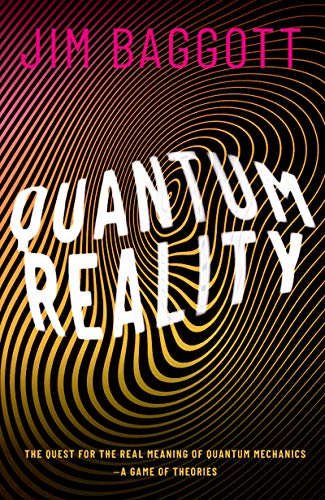
Why is quantum mechanics different from the rest of physics? What is reality? How could a theory of science explain a natural world created by God? All these strange questions are answered in a very profound and logical manner in Jim Baggott’s Quantum Reality. The book explains the connection between science and philosophy, and also describes the steps that lead to the development of any scientific theory.
From the historical Bohr-Einstein debates to the intriguing Copenhagen interpretation, Baggott’s book on quantum mechanics covers an interesting account of the science, history, and real-world consequences linked with quantum theory. The great American physicist Richard Feynman once famously said, “I think I can safely say that nobody really understands quantum mechanics” – and this book somehow unveils the actual reason behind this statement.
QED: The Strange Theory of Light and Matter – Buy Now

If you seek to gain an understanding of the quantum theory of light, then QED is one of the books that you must read. Written by Nobel laureate Richard P. Feynman, the book explains the interaction and behavior of light, in the simplest language possible.
Feynman uses clarifying examples, visual elements, spatial concepts, and his own Feynman diagrams to effectively explain complex concepts such as Heisenberg’s uncertainty principle and the wave nature of light, as well as equations that are associated with the quantum theory of light.
Fundamental: How Quantum and Particle Physics Explain Absolutely Everything (Except Gravity) – Buy Now

Want to dig into quantum physics but the math part feels too intimidating? Here is Fundamental , a book that explains the quantum realm in an easy and enjoyable way. This book incorporates the stories of scientists who contributed to the development of quantum physics and explains how this branch of science led to the creation of modern technology and cosmic theories.
Fundamental also focuses on the quantum field theory and its significance after the discovery of the Higgs-Boson particle , and it reveals some important insights on the various aspects of particle physics that govern the behavior of matter and energy. Written by science writer Tim James, this comprehensive book is a must-have collection of all the theories and principles that can be considered essential to quantum mechanics.
Something Deeply Hidden: Quantum Worlds and the Emergence of Spacetime – Buy Now

A thought-provoking work by author and theoretical physicist Sean M. Carroll, Something Deeply Hidden focuses on superposition — the remarkable property of sub-atomic particles to possess mutually exclusive properties like position or spin at the same time— and carefully explains the way quantum mechanics perceives the fabric of space-time, and also delivers important insights into what’s known as the “Many Worlds” interpretation of quantum mechanics. The book acts as a carefully reasoned argument for taking this interpretation seriously. This is an enjoyable read suited for both amateurs and experts interested in this theory.
How to Teach Quantum Physics to Your Dog – Buy Now

This international bestseller, from the author of Breakfast with Einstein, is a treasure trove for novices to the world of physics, and those searching for a clear and straightforward way to understand quantum mechanics. Writer Chad Orzel attempts to describe the complex principles of quantum theory in his own humorous way – by looking at it from the point of view of a dog named Emmy.
Emmy is fascinated by physics. Could she use quantum tunneling to get through the neighbor’s fence? How about diffracting around a tree to chase squirrels? Or using virtual particles to catch bunnies made of cheese?
The book is a lighthearted take on quantum mechanics but it doesn’t avoid on the scientific depth that quantum theory holds in the context of our physical world. By the end, Orzel manages to explain to Emmy why quantum mechanics exists and how it affects the world around us.
Beyond Weird: Why Everything You Thought You Knew about Quantum Physics Is Different – Buy Now
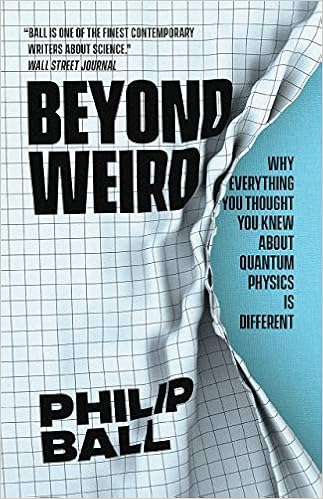
Looking for a book that not only provides you with some exclusive scientific knowledge on quantum mechanics but also incorporates some controversial elements related to the subject? Then Beyond Weird is one book you should definitely go for.
Written by Philip Ball, the book explains the counterintuitive principles behind our existence while shining light on the most recent developments in the field of quantum physics. The research contained within also goes beyond the particle and wave nature of matter, making it larger in scope than other books like it.
Quantum Mechanics: The Theoretical Minimum – Buy Now

Theoretical Minimum is a rare New York Times’ bestseller on quantum mechanics, written by Leonard Susskind and Art Friedman. It offers clear explanations of important principles such as quantum entanglement, time dependence, quantum states, etc. The book explains the nature and behavior of subatomic particles in terms of explicit mathematical derivations, and at the end of each topic there are exercises that help you to understand more about the physics behind the theories.
The book serves as a great toolkit to beginning a study of quantum mechanics. With its balanced approach to both equations and theory, readers are able to grasp complex quantum physics concepts in a structured and convenient manner.
Einstein, Quantum Theory, & the Pursuit of the Paranormal – Buy Now

Looking for something a bit off the beaten path? If you’ve got a soft spot for the paranormal, then Einstein, Quantum Theory, & the Pursuit of the Paranormal might be for you. It takes a unique approach to quantum theory that attempts to explain how quantum physics can be used to explain parapsychology and mysticism.
Written by paranormal investigator Dr. Eric O’Dierno, the book is a treat for those “who want to believe”. The author includes case files from his own paranormal investigations and attempts to find answers for unexplained phenomenon through the prism of quantum mechanics. While healthy skepticism is definitely warranted, even Einstein found parts of quantum mechanics “spooky”, so speculating about the implications of a multiverse and other downright weird aspects of quantum theory isn’t as outlandish as it sounds.
RECOMMENDED ARTICLES
The problem of time: quantum mechanics versus general relativity – buy now.

Exactly what did Einstein mean when he said that “time is an illusion”? What is time, exactly? What does this have to do with quantum mechanics? The Problem of Time will help answer these questions as it takes you through the background independence of quantum mechanics, minisuperspace models of general relativity , and the concept of supergravity.
The main focus of the book is the way two different paradigms of physics, quantum mechanics and general relativity, perceive time, where they differ, and what it might mean.
For those who have some prior understanding of quantum theory and would like to read a book that explores some more advanced concepts, then The Problem of Time may turn out to be your new favorite book on quantum mechanics and easily closes out our list of the 10 best quantum mechanics books.
The Blueprint Daily
Stay up-to-date on engineering, tech, space, and science news with The Blueprint.
By clicking sign up, you confirm that you accept this site's Terms of Use and Privacy Policy
ABOUT THE EDITOR
Rupendra Brahambhatt Rupendra Brahambhatt is an experienced writer, researcher, journalist, and filmmaker. With a B.Sc (Hons.) in Science and PGJMC in Mass Communications, he has been actively working with some of the most innovative brands, news agencies, digital magazines, documentary filmmakers, and nonprofits from different parts of the globe. As an author, he works with a vision to bring forward the right information and encourage a constructive mindset among the masses.
POPULAR ARTICLES
Uk scientists eye dormant volcano juice to extract battery metals, energy, australia: humpback whale stuck in 1760 pounds of rope set free by rescuers, ‘nightmare’ peleliu: us to rebuild wwii runway in pacific to counter china, detroit rejects face recognition after grainy video got wrong man arrested, related articles.

China builds replicas of US’ most sophisticated warplanes for target practice

Powerful US SeaGuardian drone to get NEW weapons for long-range attacks

US builds world’s most accurate atomic clock ever to boost space science

Feel the beat: MIT’s brain-powered bionic leg lets amputees dance again
Best Books Hub
Reviews of The Best Books on Every Subject
20 Best Quantum Physics Books (2022 Review)
September 15, 2020 by James Wilson
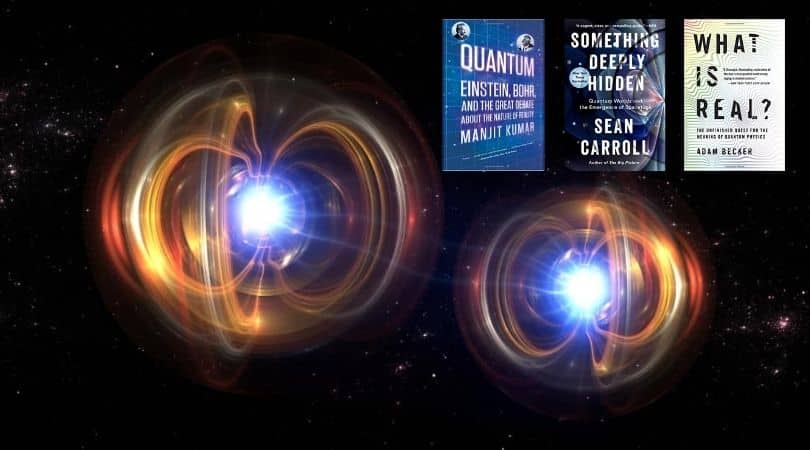
DISCLOSURE: This post may contain affiliate links, meaning when you click the links and make a purchase, I receive a commission. As an Amazon Associate I earn from qualifying purchases.
Learning more about quantum physics could be an excellent way to gain a better understanding of our world. Quantum theory can describe energy and matter at the subatomic atomic levels that goes far beyond the classical level of physics. If you have always been interested in studying quantum physics and you would like to expand your overall knowledge of this complex subject matter, it could be helpful to get access to a good learning guide to aid you in your self-study. We have gone through some of the best new quantum physics books which are available to decide on the best quantum physics guides that you could be using to build up your knowledge on the subject.
What are the Best Quantum Physics Books to read?

Here are some of the best quantum physics books you could be reading today:
Best Quantum Physics Books: Our Top 20 Picks
Here are some of the best quantum physics books that you can consider to expand your knowledge on the subject:
1. Quantum Einstein debate
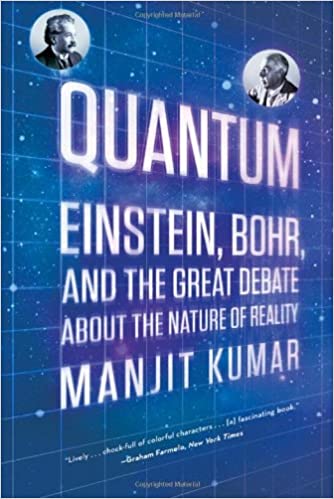
Quantum Einstein debate is an exploration of quantum theory from a historical perspective. Manjit Kumar dives deep into the mysterious nature of quantum theory and its formation. In a complete guide to the history of science, this debate looks into some of the arguments surrounding fundamental debates within quantum physics and science itself.
With inner conflicts and debates between Bohr and Einstein as well as and in-depth dive to the soul of science at its core and the ideas that guide its progress, this is a different guide that you will see based on the formation of science and its principles.
- Authors : Manjit Kumar (Author)
- Publisher : W. W. Norton & Company; Illustrated Edition (May 9, 2011)
- Pages : 448 pages
2. Something deeply hidden in the emergence of space-time
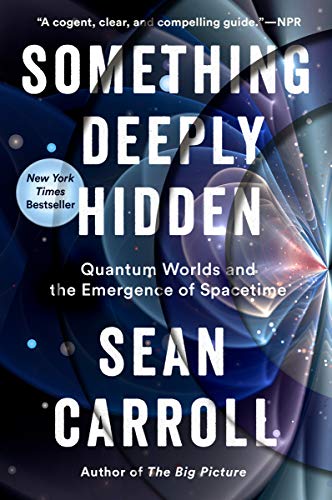
Sean Carroll is a theoretical physicist and the writer of this celebrated novel on 20th century physics. Something Deeply Hidden uses pieces of the quantum puzzle and relates them to issues within our modern world. With details on Einstein’s theory of relativity as well as the way that physics has shaped itself since the year 1927, there are a number of revisions to theories that Carol calls a physics crisis.
This is a book that could have you thinking in a completely unique way and changing the nature of how you view the world as well as conflicts within our world. It’s tough to reorganize ourselves in the state of the universe but choosing a new understanding can often mean understanding what we are made of and how we can build a future in time and space with our own understanding.
- Authors : Sean Carroll (Author)
- Publisher : Dutton (September 10, 2019)
- Pages : 362 pages
3. What Real Unfinished meaning in Quantum Physics
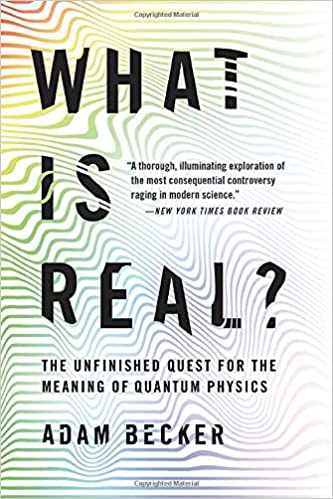
The unfinished meeting in quantum physics is a book that explores a quest for the real meaning of quantum physics. The book, by Adam Becker completed detailed examination of humanity’s most significant scientific achievements as well as the way that courageous scientists were able to stand up for their ideas and share what their view of the world and science was about.
The detailed research here goes through the quest for meaning in quantum physics throughout our world. The questioning of the series of Hugh Everett, David Bohm and John Bell are all explored in this novel. The accessible account of these theories is explored throughout the novel and it is written in an easy method to understand.
- Authors : Adam Becker (Author)
- Publisher : Basic Books; Reprint Edition (September 3, 2019)
- Pages : 384 pages
4. Quantum physics: A beginner’s guide
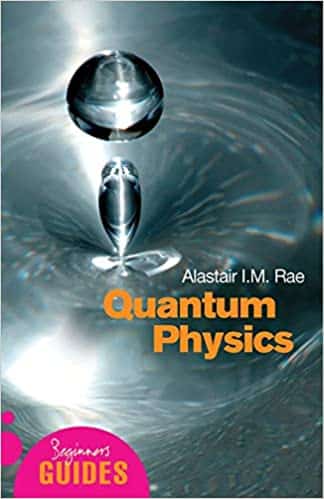
A beginners guide to quantum physics by Alastair I.M. Rae is a book that is designed to help you navigate quantum physics in accessible language. Drawing on a wide range of professional expertise, Rae can cut through the technical jargon associated with quantum physics to explain many of these theories in plain English.
As a beginners guide, the quantum physics theory that is explored cuts through the extreme technicality of quantum physics and works to apply solutions in the way that it affects our daily lives. If you are seeking a book that can help you build a base knowledge of quantum physics and an understanding of how it affects our world, this is a novel that can help you get started.
- Authors : Alistair I. M. Rae (Author)
- Publisher : Oneworld Publications (July 1, 2005)
- Pages : 240 pages
5. Quantum Physics for dummies
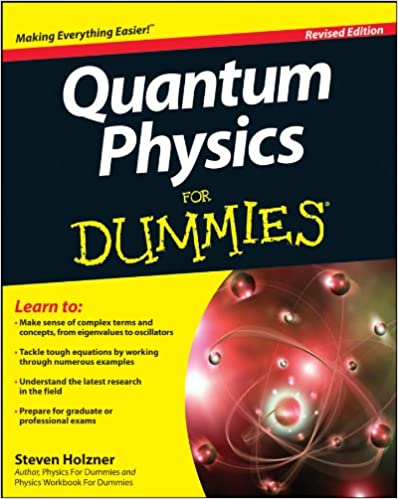
Quantum physics for dummies is a revised edition written by Steven Holzner. The book makes quantum physics much more understandable and accessible than ever before. Understanding were quantum physics has come from as well as an in-depth understanding of hydrogen atoms and our world at a subatomic level, this is a revised edition of the original dummies book that can help someone turn from an absolute beginner into somewhat of an expert in quantum physics.
The book can take you up to a graduate or professional level examination and it has a wide range of theories covered as well as unique applications for these theories. If you’ve ever wanted to learn more about the foundations of quantum physics, the Schrödinger equation, vector notation, scattering theory and more, you can gain in-depth understanding using this guide.
- Authors : Steven Holzner (Author)
- Publisher : For Dummies; Revised Edition (January 29, 2013)
- Pages : 336 pages
6. Beyond weird everything
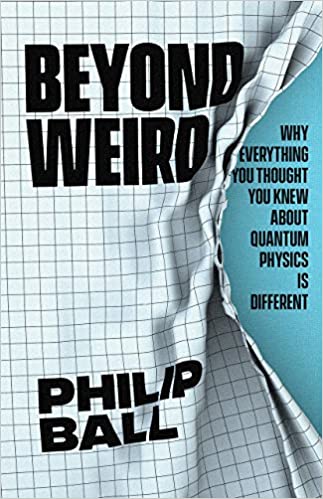
Beyond weird everything is a book by Philip Ball that starts with the theories of Niels Bohr and continues to delve into shocking relations within our world. Ball speaks of the unseen forces that are found throughout our world and the nature of the quantum underside of our reality.
The functions that may not seem obvious in our day-to-day lives are actually the foundations that build our world and the way that they are explained here unfolds like a good thriller novel. As a complete study of the quantum landscape, the book covers a series of concepts about particles and waves and the basics of quantum physics in our world.
- Authors : Philip Ball (Author)
- Publisher : University of Chicago Press; First Edition (October 18, 2018)
7. My first book Quantum Physics
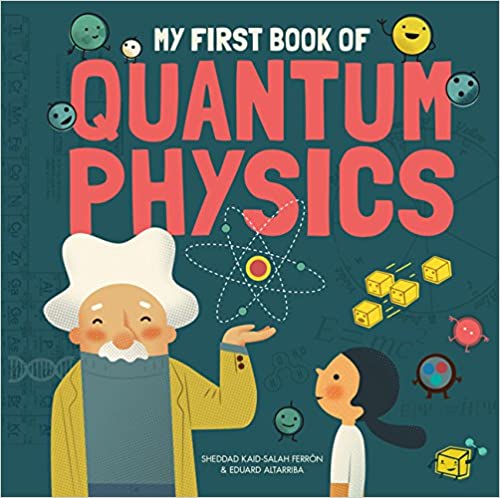
Designed for a beginners reading level and for children, this hardcover book by Kiad-sala Ferron Sheddad and illustrator Eduard Altarriba helps children understand the basics of quantum physics. With extremely easy to digest text, his book details how everything is related and composed of minute particles. The book goes through a number of objects in our world including the air, water, food, trees, buildings and more.
Quantum physics continues to push the boundaries of what we know and science and the structure of the universe and this book explores the wonders of this discipline. Some of the initial topics that are covered include mass, photons, atoms, molecules, wave particle duality, matter and antimatter and more. Although it may sound intimidating, this is a book that is perfect for classroom study or for any young mind.
- Authors : Kaid-Sala Ferrón Sheddad (Author), Eduard Altarriba (Illustrator)
- Publisher : Button Books; Illustrated Edition (August 1, 2018)
- Pages : 48 pages
8. Physics God Consciousness
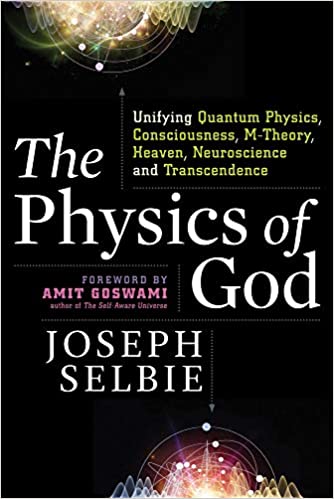
Understanding the physics of our deities and the material ballots that we place on a variety of events in our world can be difficult. The explanation of various phenomena and miracles is explored in this book. With ideas on the concept of neuroscience, transcendence, heaven, consciousness and more, this book works to pull back many of the allusions that are simply explained by magic or religion.
The book is produced by author Joseph Selbie and it delivers a unique interpretation on matter as a whole and the miracle making power of matter in our lives today. Any intelligent observer can begin to see the effects of spiritual phenomenon and apply some of these theories towards the nature of their creation.
- Authors : Joseph Selbie (Author), Amit Goswami PhD (Foreword)
- Publisher : Weiser; First Edition (September 18, 2017)
- Pages : 208 pages
9. Quantum physics what everyone needs to know
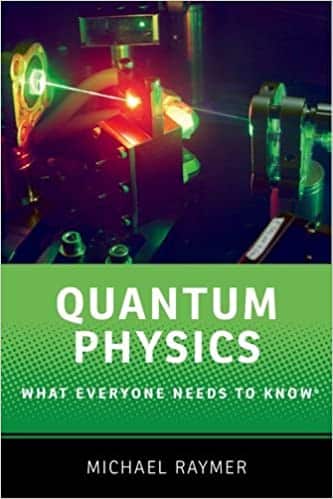
This introductory guide to quantum physics details white you need to know to understand the basics of particles. With guides on how to understand electrons, protons and neurons author Michael G. Raymer understand how we can predict the individual behaviour of an atom and find comparable results in the real world. With the principles of classic physics as well as new mechanics that can explain the phenomenon on a more global scale, this is an intellectual guide that can explain some of the most important moments throughout the history of physics.
With detailed modern examples such as how computers work, how quantum physics has evolved and how various principles of physics apply to our modern world, we are able to interpret the changes that can come as a result of wide reaching physics problems.
- Authors : Michael G. Raymer (Author)
- Publisher : Oxford University Press; 1st Edition (July 5, 2017)
- Pages : 334 pages
10. Quantum Physics Idiot guides
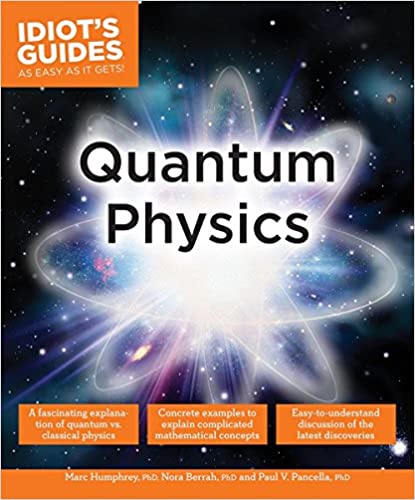
Quantum physics the idiots guide is written by Marc Humphery and Norra Berrah as well as Paul V Pancella. These three experts explore the concepts of quantum physics and how they relate to our world. In this idiot’s guide, actually complex topics are broken down into easy-to-understand solutions for students and science enthusiasts. Rather than focusing in on the math and equations behind quantum physics, this is a book that explains more on the concepts and implications of quantum physics in our own world. Including many of the paradoxes as well as the fascinating subjects associated with quantum physics this is an excellent starting point to help drive inspiration into the subject.
Topics covered include the Heisenberg uncertainty principle, quantum and classical physics as well as the double slit experiment. There are a number of excellent jumping off points that can be used here and the unintimidating and mathless approach can make sure that anyone can pick this up and learn some of the basics surrounding quantum physics.
- Authors : Marc Humphrey (Author), Paul V. Pancella (Author), Nora Berrah (Author)
- Publisher : Alpha (January 6, 2015)
- Pages : 352 pages
11. Quantum Physics hippies
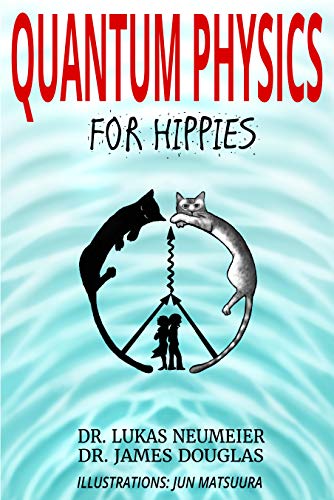
Quantum physics for hippies is written by Dr. Lucas Neumeier, Dr. James Douglas and Jun Matsuura. The book is designed to be an entertaining and insightful look at quantum physics from a more fun and uncomplicated respective. If you’re interested in learning more about quantum physics but you feel bombarded by the equations of the math, this is a book that is written to be easy-to-read and entertaining while also providing you with the knowledge you need to dissect quantum physics theory.
Written by esoteric writers, this is a book that can quickly change or perspective while also giving you a thrilling reading experience. Rather than getting bombarded by a series of complicated explanations, you can have many of the details of the concepts without having a constant bombardment with technical knowledge and mathematics. The illustrations in this book as well as the fun and creative writing will have you reading page after page. The series will also help you to change the way that you look at the world.
- Authors : Dr. Lukas Neumeier (Author), Dr. James Douglas (Author), Jun Matsuura (Illustrator)
- Publisher : Independently published (April 4, 2019)
- Pages : 175 pages
12. Physics molecules
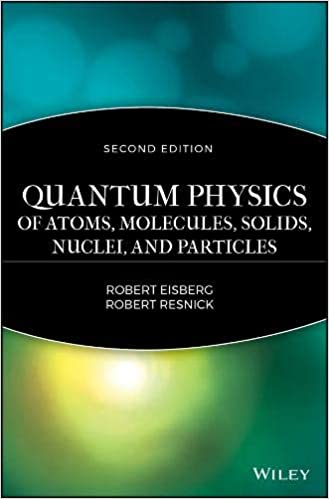
The quantum physics of Atoms, molecules, particles, nuclei and more includes a junior and senior level textbook understanding from Robert Eisberg and Robert Resnick. The application of theory and the emphasis on the Mossbauer effect are highlighted here.
With new material on particle physics in this latest revision, the book details a series of theories that can assist with the understanding of various states within our world. With a detailed description of various molecules within our world, the quantum physics theories in this can explain almost every element of our physical world.
- Authors : Robert Eisberg (Author), Robert Resnick (Author)
- Publisher : John Wiley & Sons; 2nd Edition (January 1, 1985)
- Pages : 864 pages
13. Possibility principle Quantum physics improvements
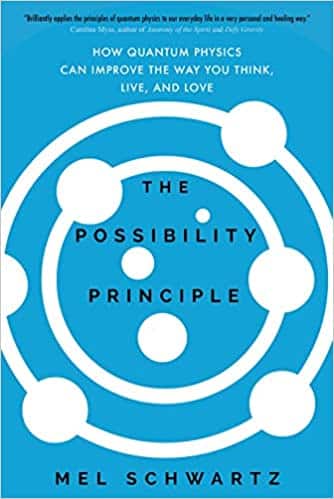
The possibility principle is a book that studies quantum physics and how it can improve your quality-of-life. Written by Mel Schwartz, the book shares how our goals can be attained by focusing into a proper life vision. This is the relation to putting ourselves in a position to positively impact the future. This is an extremely groundbreaking work in physics because it shows our role and the way that our thoughts can relate to our future.
Schwartz integrates a series of new quantum worldviews into our everyday lives. It shows that we can transcend our own limitations and find infinite possibilities and positive probabilities using the possibility principal. Whether you are interested in studying the positivity of quantum physics or you would like to learn more about how it could boost your quality-of-life, this could be an excellent book for you.
- Authors : Mel Schwartz (Author)
- Publisher : Sounds True (August 31, 2017)
- Pages : 200 pages
14. Quantum physics overview conceptual foundations
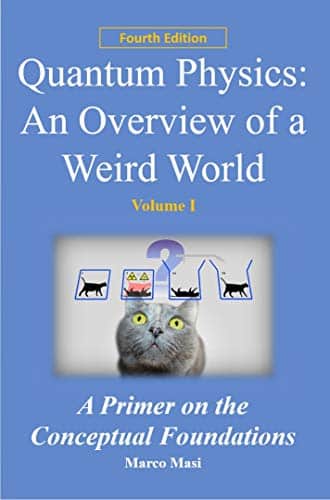
Quantum physics: an overview of a wheeled world and conceptual foundations in physics is written by Marco Masi. It’s the first book in a two-volume book series that includes some of the basics of quantum physics and its conceptual foundations. The book comes with a supplement of online learning as well as a series of video lectures that will take you through the various chapters.
The basic idea of this book is to help budding minds to separate science fact from fiction in pseudoscience. By utilizing physics it possible to interpret any puzzle and to work with simplifying paradoxes in our own world. By using the knowledge of various scientists and philosophers is possible to piece together information and create an arch of knowledge within the discipline of quantum physics. From basic concepts to in-depth technical knowledge, this book can cover it all and serve as a fine primer for future knowledge in quantum physics study.
- Authors : Marco Masi (Author)
- Publisher : Independently published (March 19, 2019)
- Pages : 344 pages
15. Quantum physics energy healing
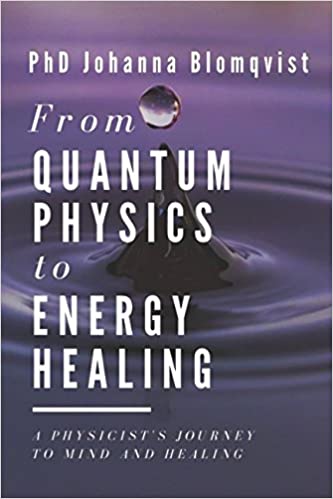
Quantum physics for energy healing is a book on the journey of healing and the mind. Written by Dr. Johanna Blomqvist, this book delivers an informative introduction to journey and expiration of the mind with a basis of quantum physics for ceiling. Alternative healing practices in quantum physics are two items that are not commonly used in the same breath but with this concept of energy transmission it’s possible to find new ways to build improvements in one’s lifestyle according to energy healing and atoms.
Detailing her own experience and the scientific models that she drew inspiration from, Energy healing uses modern scientific approaches to explain the vibrating energies at a subatomic level. The book also delves into our consciousness and how we can work at improving positive energy within our consciousness. Written by an energy healer, Reiki master and physicist, this is a completely unique guide to healing.
- Authors : PhD Johanna Blomqvist (Author), Tuula Yrjö-Koskinen (Translator)
- Publisher : Mindstream Publishing (May 22, 2018)
- Pages : 292 pages
16. Physics Minutes
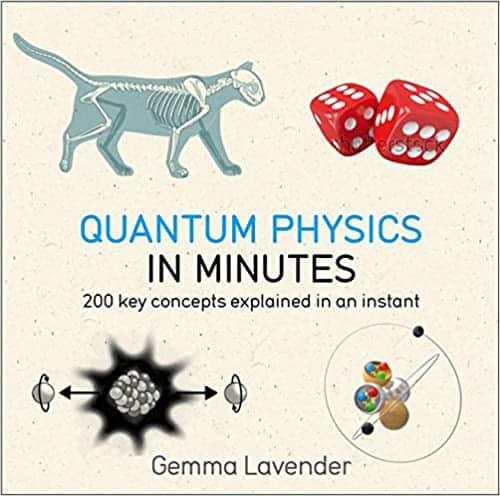
Quantum physics remains one of the most baffling subjects to manage in science today. As a highly intimidating subject it can explain the nature of teleportation, antimatter, parallel universes and today’s digital technology.
Understanding these topics can give you a new way to look at the world and an understanding of some incredibly complex topics. Gemma Lavender is an author that has produced a book on 200 key concepts within quantum physics that you can pick up in just minutes. Explain these concepts via illustrations and step-by-step guides can give you a window into the nature of our reality. The 200 simple diagrams serve is an excellent learning guide to help you dive into the basics of physics.
- Authors : Gemma Lavender (Author)
- Publisher : Quercus (June 6, 2017)
- Pages : 416 pages
17. Quantum Physics a fundamental approach
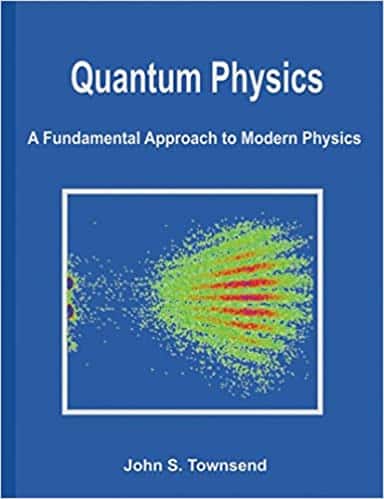
This fundamental approach to modern physics is written by John S. Townsend. It is a full textbook worth of knowledge including an innovative introduction to quantum mechanics. The illustrations in the textbook as well as the easy-to-understand text can help you to build a knowledge of wave mechanics and quantum mechanics for applications in nuclear, solid-state and particle physics.
Most of the topics in this focus on band structure solids as well as particle physics. Students interested in studying quantum mechanics and building a coherent picture of how the world works will find direct interest in this textbook. It’s also been adopted as one of the main instructors manuals for many professors teaching this subject matter.
- Authors : John Townsend (Author), Laurel Muller (Illustrator)
- Publisher : University Science Books; First Edition (August 7, 2009)
- Pages : 510 pages
18. Philosophy physics Princeton
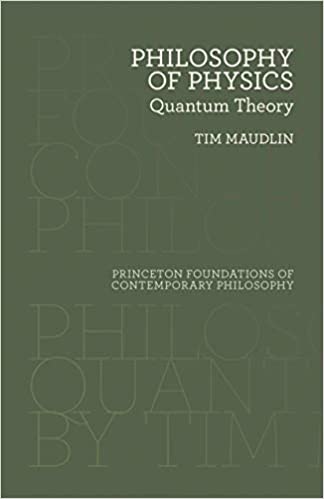
Tim Maudlin is one of the leading philosophers and physics experts worldwide. This sophisticated and original introduction between quantum mechanics and philosophy delivers the most refined and clear account of the subject lines between the two. The book is invaluable for students that are studying both philosophy and physics at the same time. As quantum mechanics is an important theory within physics, it continues produce accurate results in a variety of scientific theory.
The agreement between these theories and the physical reality of our world can make sure that there can be a predictive recipe for some of the most complex theories that we face every day. This book challenges the new worlds theory of Everett and continues to deliver a sophisticated marriage between philosophy and modern physics.
- Authors : Tim Maudlin (Author)
- Publisher : Princeton University Press (March 19, 2019)
- Pages : 256 pages
19. Quantum physics made easy
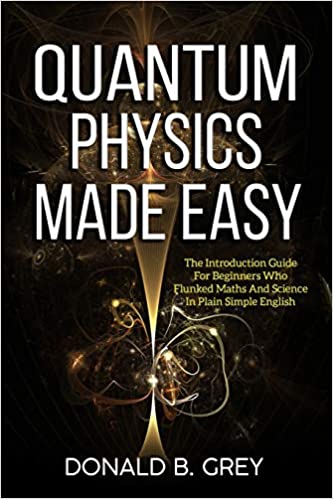
Quantum physics made easy is written by Donald B. Grey. The goal of this book is to present quantum physics in a format that is easy for those that find math and science intimidating. Written in a fun and charismatic way, this book poses many common questions about our world and then explains them with quantum physics. You can learn more about the elusive Schrödinger’s cat, if string theories are truly made out of string and the nature of black holes.
The book delivers a basis of knowledge that can help people solve everyday mysteries. If you are the type of person that finds science extremely intimidating or that gave up on science in high school, this is a great way to dive back in and discover new meaning in the world through quantum physics.
- Authors : Donald B. Grey (Author)
- Publisher : Independently published (April 22, 2019)
- Pages : 56 pages
20. Understanding quantum physics
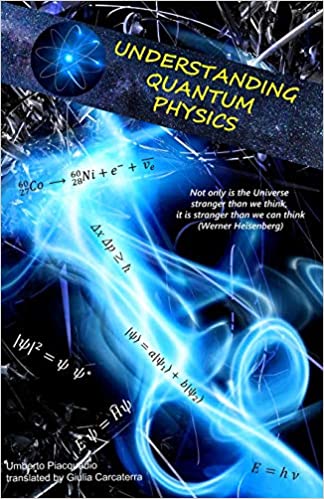
Understanding Quantum Physics is a book from Umberto Piacquadio and Giulia Carcaterra, his translator. Explaining the various principles of quantum physics and how it relates to our physical world means truly understanding all bodies at work. By delving deep into what makes up electromagnetic phenomenon, the motion of celestial bodies and more we can determine how our world is moving into the comic level.
Starting with the beginning of in-depth studies completed by Bohr, Planck and Einstein, the book continues on with a series of theories on classical foundation with Heisenberg and Schrödinger. Starting with the causality of theory and leading to an updated understanding including all equations, this is a book that can prepare you for future in-depth University study. The understanding of quantum physics from this book could serve as an early primer or textbook or give you the perfect base of knowledge if you are approaching a coarse level study. As an independently published book, this is gaining headway in the community and it has become a guide that is perfect for gaining an understanding of the world of quantum physics.
- Authors : Umberto Piacquadio (Author), Giulia Carcaterra (Translator)
- Publisher : Independently published (June 11, 2019)
- Pages : 225 pages
Choosing the Best Quantum Physics Books
If you are interested in studying quantum physics at a beginner level, advance level or even as a young reader, there are books that we have detailed in this article which can help you to gain a based knowledge in quantum physics today. With a wide range of books available is important to find something that’s going to be at your level and designed for your interest. With books available that shy away from mathematics and include reading at a beginner level to an experienced level of quantum physics knowledge, we have made sure that you can take on learning within any comfort zone you may have. Be sure to pick up one of these books if you would like to understand some of the basics of quantum physics from the perspective of many different authors.

Subscribe To Email List
FREE Great Book Recommendations
Don't Miss Out On Books You Must Read
We won't send you spam. Unsubscribe at any time
9 Best Quantum Physics Books of All Time
Our goal : Find the best Quantum Physics books according to the internet (not just one random person's opinion).
- Type "best quantum physics books" into our search engine and study the top 5+ pages.
- Add only the books mentioned 2+ times.
- Rank the results neatly for you here! 😊 (It was a lot of work. But hey! That's why we're here, right?)
(Updated 2024)
As an Amazon Associate, we earn money from purchases made through links in this page.
Last Updated: Monday 1 Jan, 2024
- Best Quantum Physics Books

How to Teach Quantum Physics to Your Dog

Something Deeply Hidden
Quantum worlds and the emergence of spacetime.
Sean Carroll

The Strangest Man
The hidden life of paul dirac, mystic of the atom.
Graham Farmelo

The Ghost in the Atom
A discussion of the mysteries of quantum physics.
P. C. W. Davies

Quantum Physics For Dummies
Steven Holzner

Beyond Weird
Why everything you thought you knew about quantum physics is different.
Philip Ball

Quantum Reality
Beyond the new physics.
Nick Herbert

The Second Creation
Makers of the revolution in twentieth-century physics.
Robert P Crease

Einstein, Quantum Theory & the Pursuit of the Paranormal
How science and belief relate to human consciousness & paranormal investigation.
Dr. Eric O'Dierno
- Best Quantum Physics Books | It's Use in Everyday Life www.onlinebooksreview.com
- 20 Best Quantum Physics Books (2022 Review) - Best Books Hub bestbookshub.com
- David Kaiser's top 10 books about quantum theory | Books | The Guardian www.theguardian.com
- The 10 Best Quantum Mechanics Books interestingengineering.com
- 15 Must Read Bestselling Quantum Physics Books 2021 - Leverage Edu leverageedu.com
What To Read Next

Explore other lists
Share this page
Email us if you have any feedback
19 Best Books for Quantum Physics: Explore the Fascinating World of Quantum Physics with These Must-Reads
Discover our expert guide to learn about quantum physics, quantum mechanics, and quantum theory from the best books for quantum physics.
The word ‘ quantum physics ‘ alone can be daunting. Even though we know physics is the key to understanding our universe, studying areas like particle physics, quantum entanglement, and relativity can be a struggle. At the core of this field of study is an attempt to explain why matter and energy behave the way they do.
Many authors write about modern physics using styles that move away from the dry textbook style we became accustomed to in school . The field of quantum physics has come a long way, with modern physicists building on the ideas of classic physicists such as Albert Einstein. Modern developments such as quantum computing and quantum field theory have made this field of study more complicated but even more fascinating.
Best Books for Quantum Physics Ranked
1. something deeply hidden: quantum worlds and the emergence of spacetime by sean carroll, 2. quantum mechanics: the theoretical minimum by art friedman and leonard susskind, 3. physics without prior knowledge: become an einstein in 7 days by benjamin spahic, 4. seven brief lessons on physics by carlo rovelli, 5. how to teach quantum physics to your dog by chad orzel, 6. introduction to quantum mechanics by david j. griffiths and darrell f. schroeter, 7. revolutions in twentieth-century physics by david j. griffiths, 8. quantum theory (great works that shape our world) by niels bohr and max planck, 9. the age of entanglement: when quantum physics was reborn by louisa gilder, 10. the feynman lectures on physics, boxed set: the new millennium edition by richard p. feynman, 11. the physical principles of the quantum theory by werner heisenberg, 12. eight lectures on theoretical physics by max planck and his 1920 nobel prize address on the origin and development of the quantum theory by max planck, 13. quantum information theory by mark m. wilde, 14. the principles of quantum mechanics by p. a. m. dirac, 15. qed and the men who made it: dyson, feynman, schwinger, and tomonaga by silvan schweber, 16. quantum physics for beginners: from wave theory to quantum computing by carl j. pratt, 17. qed: the strange theory of light and matter by richard p. feynman, 18. relativity: the special and general theory by albert einstein, 19. what is real the unfinished quest for the meaning of quantum physics by adam becker.

Something Deeply Hidden: Quantum Worlds and the Emergence of Spacetime is a fascinating exploration of how quantum physics can be used to understand space and time. Sean Carroll uses quantum physics to explain the ‘many-worlds’ theory which suggests that many realities are possible.
Trying to get your head around space-time is almost painful, but Carroll explains how we can interpret space and time as one entity using a relatively easy-to-understand system. This book focuses heavily on theory and less on the deeper mathematics, so if you aren’t much of a number cruncher, this could be an excellent book for you. You might also be interested in these books about physics for beginners .
“We are part of the universe that has developed a remarkable ability: We can hold an image of the world in our minds. We are matter contemplating itself.” Sean Carroll, Something Deeply Hidden: Quantum Worlds and the Emergence of Spacetime

Quantum Mechanics: The Theoretical Minimum is an excellent book for beginners who want to get familiar with the basic ideas behind quantum mechanics. Art Friedman and Leonard Susskind are both highly-experienced physicists who have studied everything from classical physics to the ideas of the most respected theoretical physicist.
In addition, both of them have extensive experience as educators, which is reflected in this book which has been widely praised for its clear style that covers complex topics in an easy-to-understand way. Susskind and Friedman have filled them with dozens of exercises that help the reader check that they’ve understood what they’ve read.
The book has been hugely successful and became a top 10 best seller in the Amazon mechanical physics category. This book is excellent for anyone looking to grasp fundamental quantum physics principles. You may also be interested in these articles about chemistry .
“Einstein, in the special theory of relativity, proved that different observers, in different states of motion, see different realities.” Leonard Susskind, Quantum Mechanics: The Theoretical Minimum by Art Friedman

Physics Without Prior Knowledge: Become an Einstein in 7 Days is an excellent book for beginners who want to get familiar with Albert Einstein’s major theories and basic mathematical formulas in quantum physics, thermodynamics, and electromagnetism.
Benjamin Spahic is a German engineer with a background in applied sciences whose research focuses on energy production by regenerative means. This guidebook uses real-world examples and clearly explained illustrations to explain physics to beginners and new students.
As the book is only 150 pages long, you will need more than this to give you a detailed explanation of specific aspects of quantum physics, such as quantum gravity or quantum states. Still, it’s a great book to use as an introduction to physics before moving on to a more detailed book.
“Physics is discussed everywhere, whether on public television, at school and university, or in private circles. But what is physics exactly?” Benjamin Spahic, Physics Without Prior Knowledge: Become an Einstein in 7 Days

Seven Brief Lessons on Physics is one of the most successful books on modern physics for beginners, having sold millions of copies worldwide and been translated into over 40 languages. Carlo Rovelli is an Italian physicist whose research focuses on quantum gravity, quantum mechanics, and the philosophy of science.
In this book, Rovelli breaks down the most intriguing concepts of modern physics, including black holes, quantum mechanics, elementary particles, and the nature of reality. Rovelli approaches physics writing from a non-technical stance, making his work popular among beginners. If you’ve struggled to understand quantum physics so far due to the technical languages and mathematics, Seven Brief Lessons on Physics could be your savior.
“Because everything that begins must end. What causes us to suffer is not in the past or the future: it is here, now, in our memory, in our expectations. We long for timelessness, we endure the passing of time: we suffer time. Time is suffering.” Carlo Rovelli, Seven Brief Lessons on Physics

How to Teach Quantum Physics to Your Dog is a book that aims to explain quantum physics in the most accessible way possible. Chad Orzel approached the challenge of explaining quantum physics from a unique perspective by creating a narrative in which each chapter is written as if he were explaining the subject to Emmy, his dog.
Despite the light-hearted approach, Orzel manages to cover some very complex ideas without using jargon and long equations. He covers particle-wave duality, Erwin Schrödinger’s principle theories, many worlds, quantum tunneling, and Heisenberg’s uncertainty principle.
The book has received excellent reviews from Nobel Prize winners, publishers, science book authors, and individuals on Amazon. If you’re looking for an easy-to-read guide to quantum physics with a humorous narrative, this book is great.
“The photoelectric effect ought to be readily explained by thinking of light as a wave that shakes atoms back and forth until electrons come out.” Chad Orzel, How to Teach Quantum Physics to Your Dog

Introduction to Quantum Mechanics by David J. Griffiths and Darrell F. Schroeter is a physics textbook that explains the most important aspects of quantum mechanics in a relatively informal style. As this is a textbook, be prepared to encounter a fair amount of technical language that might only suit some beginners.
Griffiths and Schroeter are both professors at Reed College with extensive experience in quantum mechanics and physics. The third edition of this popular textbook covers several topics, including wave-particle duality, the Schrödinger equation, and quantum mechanics of systems.
“But physics is like carpentry: Using the right tool makes the job easier, not more difficult, and teaching quantum mechanics without the appropriate mathematical equipment is like asking the student to dig a foundation with a screwdriver.” David J. Griffiths and Darrell F. Schroeter, Introduction to Quantum Mechanics

Revolutions in Twentieth-Century Physics focus on relativity, quantum mechanics, elementary particles, and cosmology, the four core principles of modern physics. Although the book covers some pretty technical topics, it is suitable for beginners, but it will help if you have an understanding of basic concepts before beginning.
David J. Griffiths enlightens the reader about Feynman diagrams, curved space-time, the Big Bang Theory, and the expanding universe using clear examples and illustrations. By reading his book, you’ll be able to understand the sort of theories found in undergraduate thick-textbooks without tearing out your hair over high-level mathematics. The book has been praised by individuals on Amazon, and Science Magazine noted that Griffiths has succeeded in explaining complex topics to non-scientists.
“My own instinct is to hand the students shovels and tell them to start digging. They may develop blisters at first, but I still think this is the most efficient and exciting way to learn.” David J. Griffiths, Revolutions in Twentieth-Century Physics

Quantum Theory (Great Works that Shape Our World) covers the two most important advances made in the field of quantum theory in the 20th century. The book is broken down into two halves. The first covers Bohr’s’ Quantum Theory of Line-Spectra’, and the second looks at ‘The Origin and Development of Quantum Theory’ by Max Planck.
Niels Bohr is a Nobel Prize-winning Danish physicist whose research focused on quantum theory and atomic structures. Max Planck is arguably the early 20th century’s most important theoretical physicist. This book will give you a detailed explanation of quantum theory and cover the general history of this field of physics. If you want to understand modern quantum physics, learning about Planck and Bohr is crucial, and this book contains both seminal works in full detail.
“An expert is a man who has made all the mistakes which can be made in a very narrow field.” Niels Bohr, Quantum Theory (Great Works that Shape Our World)

The Age of Entanglement: When Quantum Physics Was Reborn is a collective history and technical book focusing primarily on entanglement. It also looks at the somewhat mystic idea that there are telepathic connections between particles, which Einstein had also researched during his career.
While quantum physics has told us a lot about atoms, photons, nuclei, and subatomic particles, we are still in the dark regarding the idea of entanglement. In this book, you’ll find several different takes on entanglement and how it can be approached.
Louisa Gilder’s ability to add a human element to quantum physics makes this book stand out from other theoretical books. She provides the reader with a guide to the development of quantum physics in the context of post second world war science when researchers on the Manhattan Project were faced with growing paranoia about the implication of advanced quantum physics.
“Science rests on experiments,” wrote Heisenberg, but “science is rooted in conversations.” Louisa Gilder, The Age of Entanglement: When Quantum Physics Was Reborn

The Feynman Lectures on Physics, boxed set: The New Millennium Edition , is a collection of books published in 1964 that has become the bedrock of most physics reading lists for students and non-students. The books contain a series of lectures from Richard. P Feynman , which outlines the core pillars of modern physics and then moves on to more complex ideas such as relativity and quantum states.
Feynman was known among academic circles for his ability to clearly express complex ideas, which is reflected in this collection of lectures. Reading this set of books from start to finish will reward you with vast knowledge about modern physics. Feynman often uses personal stories and everyday anecdotes to explain complex quantum theories, which can be particularly helpful for beginners struggling to comprehend new ideas.
“We are trying to prove ourselves wrong as quickly as possible, because only in that way can we find progress.” Richard P. Feynman, The Feynman Lectures on Physics, boxed set: The New Millennium Edition

The Physical Principles of the Quantum Theory contains lectures covering many quantum physics and quantum theory concepts. Werner Heisenberg is one of the 20th century’s greatest quantum theorists primarily because of his contribution to the field through the so-called ‘Heisenberg’s Uncertainty Principle.’ The German physicist’s theory, which is still widely cited to this day, argued that the more accurately we identify the position of a particle, the less precisely we can predict its momentum.
Werner’s lectures spend a considerable amount of time focusing on how a particle’s actions are impacted by the mere fact that it’s being observed. This is a valuable resource for anyone looking to get to grips with quantum physics through lectures from one of the most important 20th-century physicists.
“Whenever we proceed from the known into the unknown we may hope to understand, but we may have to learn at the same time a new meaning of the word ‘understanding.” Werner Heisenberg, The Physical Principles of the Quantum Theory
- Heisenberg, Werner (Author)
- English (Publication Language)
- 194 Pages - 08/03/2015 (Publication Date) - Martino Fine Books (Publisher)

Eight Lectures on Theoretical Physics by Max Planck and his 1920 Nobel Prize Address on the Origin and Development of the Quantum Theory is a collection of lectures and speeches encompassing Max Planck’s contribution to modern physics and Quantum Theory. Max Planck is regarded to be the father of modern physics. In 1918, he was awarded the Nobel Prize in Physics for his work which included the discovery of fundamental units of energy known as quanta. His theory was a major break from traditional theories and changed the path of physics forever.
In this book, Planck amalgamated his most important ideas and lectures. It’s a surprisingly good read for beginners as it focuses on the fundamental laws of physics developed by Planck and critical thinkers that continue to form the backbone of the field to this day.
“Science…means unresting endeavor and continually progressing development toward an aim which the poetic intuition may apprehend, but the intellect can never fully grasp.” Max Planck, Eight Lectures on Theoretical Physics by Max Planck and his 1920 Nobel Prize Address on the Origin and Development of the Quantum Theory
- Amazon Kindle Edition
- Planck, Max (Author)
- 196 Pages - 06/21/2020 (Publication Date) - Bill Stone Services (Publisher)

Quantum Information Theory is divided into six parts covering quantum information theory with great detail and technical insight. Mark Wilde uses a fair amount of algebra to explain quantum information, also known as Shannon’s information theory, so this will be a struggle for beginners. However, if you already have a quantum physics background, this book is a great way to expand your knowledge.
The book begins by covering basic quantum theory principles and then moves into more complex areas of the field, such as quantum teleportation and entanglement. Different quantum systems are also examined before combining the acquired knowledge to explore Shannon’s information theory. Shannon’s theory is essential to specific branches of quantum physics with real-world use cases such as cryptography and quantum computing.
This book is a dense read with a lot of technical information. But it will help you understand quantum information theory, which is undoubtedly one of the most exciting developments in modern quantum physics.
“The aim of this book is to develop “from the ground up” many of the major, exciting ore and post-millennium developments in the general area of study known as quantum Shannon theory.” Mark M. Wilde, Quantum Information Theory
- Hardcover Book
- Wilde, Mark M. (Author)
- 776 Pages - 02/06/2017 (Publication Date) - Cambridge University Press (Publisher)

The Principles of Quantum Mechanics was published in 1930 and remains a highly respected book in quantum mechanics circles. P.A.M. Dirac was an English theoretical physicist regarded as one of the founders of quantum electrodynamics. His work earned him the 1933 Nobel Prize for physics, which he shared with Erwin Schrödinger. The book includes Dirac’s contributions to quantum physics and explanations of core principles, such as the uncertainty principle and the fundamental mathematics of quantum physics.
Dirac has been praised for his ability to explain complex ideas in simple terms making this a solid choice for someone with minimal knowledge of quantum mechanics. However, some background in physics will be necessary.
“Living is worthwhile if one can contribute in some small way to this endless chain of progress.” P. A. M. Dirac, The Principles of Quantum Mechanics
- Dirac, P A M (Author)
- 330 Pages - 01/08/2013 (Publication Date) - WWW.Snowballpublishing.com (Publisher)

QED and the Men Who Made It: Dyson, Feynman, Schwinger, and Tomonaga tell the story of how a group of leading post-World War II physicists developed the theory of quantum electrodynamics (QED). QED described how subatomic particles behaved in the atomic realm and resolved the crisis of physics in the 1930s that arose because quantum mechanics and the theory of relativity couldn’t be reconciled.
Silvan Schweber , Professor of Physics, emeritus at Harvard University, wrote the book partly to codify that Dyson, Feynman, Schwinger, and Tomonaga essentially ‘saved’ physics and to help non-experts understand QED. The contribution of the four physicists culminated in the ability to predict how subatomic particles would behave, which in the early 1930s was considered an astounding breakthrough. This is an excellent book for learning about the history of quantum electrodynamics and developing an understanding of this critical pillar of modern physics.
“Quantum mechanics reasserted that the physical world presented itself hierarchically. The world was not carved up into terrestrial, planetary, and celestial spheres, but was layered by virtual of certain constants of nature.” Silvan Schweber, QED and the Men Who Made It: Dyson, Feynman, Schwinger, and Tomonaga
- Used Book in Good Condition
- Schweber, S. S. (Author)
- 784 Pages - 04/04/1994 (Publication Date) - Princeton University Press (Publisher)

Quantum physics is a topic that doesn’t lend itself well to true beginners, but this book gets as close as possible. Quantum Physics for Beginners: From Wave Theory to Quantum Computing introduces the reader to the basic tenets of the study, but it does use quite a bit of mathematics to do so. Thus some true beginners would say it isn’t accessible.
For those with some knowledge, it appears to have just the right amount of math combined with less intense subjects, which makes it a great choice for beginners who know a little about the topic. If you have some background in physics but not quantum physics, this is one of the best books to understand this field further. This is one of the newer books on this list of best quantum physics reads, as it was published in 2021.
“The weak nuclear force is the mechanism of interaction between subatomic particles that is responsible for the radioactive decay of atoms.” Carl J. Pratt, Quantum Physics for Beginners: From Wave Theory to Quantum Computing
No products found.

Nobel Prize-winning physicist Richard P. Feynman is well-known for his lectures that made the challenging subject of quantum physics more understandable for non-scientists. The Feynman lectures on physics are often compiled into books, and QED: The Strange Theory of Light and Matter is one of these.
This book covers electrodynamics, or the study of light, x-rays, and gamma rays. He takes the formulas of Dirac and expands them, changing the understanding of the nature of particles and how waves work. This book was first published in 1985 and remained an important work in the modern understanding of light and the electromagnetic spectrum. He also weaves some humor into his work, which is part of what makes it a popular physics book.
“What I am going to tell you about is what we teach our physics students in the third or fourth year of graduate school… It is my task to convince you not to turn away because you don’t understand it. You see my physics students don’t understand it… That is because I don’t understand it. Nobody does.” Richard P. Feynman, QED: The Strange Theory of Light and Matter
- Feynman, Richard P. (Author)
- 192 Pages - 10/26/2014 (Publication Date) - Princeton University Press (Publisher)

You can’t think of physics without thinking of Einstein, whose famous theories revolutionized the world of science in his day. He was one of the most famous scientists of classical physics, and his theory of relativity is one of his most famous scientific contributions.
He published Relativity in 1916, and the book attempted to break down the General Theory of Relativity into something the average reader could understand without truly understanding the mathematical principles of the quantum world. It was this book’s basic premise that made Einstein a household name in the science world, but it was the book’s accessibility that made him well-known to the general public.
“If you’ve never done anything wrong it’s probably because you have never tried anything new.” Albert Einstein, Relativity
- Einstein, Albert (Author)
- 192 Pages - 10/18/2010 (Publication Date) - Dover Publications (Publisher)

In What Is Real? The Unfinished Quest for the Meaning of Quantum Physics , Adam Becker argues that the interpretation of quantum mechanics based on Niels Bohr’s Copenhagen Interpretation may be incorrect. He follows the history of the great thinkers who also questioned Bohr and theorizes that we may not actually have the right answer to the age-old question of “what is real?” This is a great book to take a deeper look at quantum physics and potential additional interpretations of modern science. Becker published this in 2018.
“Science, done right, works hard to respect absolutely no authority at all other than experience and empirical data. It never succeeds entirely, but it comes closer and has a better track record than any other method we apes have found for learning about the world around us.” Adam Becker, What Is Real? The Unfinished Quest for the Meaning of Quantum Physics
- Audible Audiobook
- Adam Becker (Author) - Greg Tremblay (Narrator)
- 03/20/2018 (Publication Date) - Blackstone Audio, Inc. (Publisher)
Loved this? Check out our guide with the best books for computer science !
- NONFICTION BOOKS
- BEST NONFICTION 2023
- BEST NONFICTION 2024
- Historical Biographies
- The Best Memoirs and Autobiographies
- Philosophical Biographies
- World War 2
- World History
- American History
- British History
- Chinese History
- Russian History
- Ancient History (up to 500)
- Medieval History (500-1400)
- Military History
- Art History
- Travel Books
- Ancient Philosophy
- Contemporary Philosophy
- Ethics & Moral Philosophy
- Great Philosophers
- Social & Political Philosophy
- Classical Studies
- New Science Books
- Maths & Statistics
- Popular Science
- Physics Books
- Climate Change Books
- How to Write
- English Grammar & Usage
- Books for Learning Languages
- Linguistics
- Political Ideologies
- Foreign Policy & International Relations
- American Politics
- British Politics
- Religious History Books
- Mental Health
- Neuroscience
- Child Psychology
- Film & Cinema
- Opera & Classical Music
- Behavioural Economics
- Development Economics
- Economic History
- Financial Crisis
- World Economies
- Investing Books
- Artificial Intelligence/AI Books
- Data Science Books
- Sex & Sexuality
- Death & Dying
- Food & Cooking
- Sports, Games & Hobbies
- FICTION BOOKS
- BEST NOVELS 2024
- BEST FICTION 2023
- New Literary Fiction
- World Literature
- Literary Criticism
- Literary Figures
- Classic English Literature
- American Literature
- Comics & Graphic Novels
- Fairy Tales & Mythology
- Historical Fiction
- Crime Novels
- Science Fiction
- Short Stories
- South Africa
- United States
- Arctic & Antarctica
- Afghanistan
- Myanmar (Formerly Burma)
- Netherlands
- Kids Recommend Books for Kids
- High School Teachers Recommendations
- Prizewinning Kids' Books
- Popular Series Books for Kids
- BEST BOOKS FOR KIDS (ALL AGES)
- Ages Baby-2
- Books for Teens and Young Adults
- THE BEST SCIENCE BOOKS FOR KIDS
- BEST KIDS' BOOKS OF 2023
- BEST BOOKS FOR TEENS OF 2023
- Best Audiobooks for Kids
- Environment
- Best Books for Teens of 2023
- Best Kids' Books of 2023
- Political Novels
- New History Books
- New Historical Fiction
- New Biography
- New Memoirs
- New World Literature
- New Economics Books
- New Climate Books
- New Math Books
- New Philosophy Books
- New Psychology Books
- New Physics Books
- THE BEST AUDIOBOOKS
- Actors Read Great Books
- Books Narrated by Their Authors
- Best Audiobook Thrillers
- Best History Audiobooks
- Nobel Literature Prize
- Booker Prize (fiction)
- Baillie Gifford Prize (nonfiction)
- Financial Times (nonfiction)
- Wolfson Prize (history)
- Royal Society (science)
- Pushkin House Prize (Russia)
- Walter Scott Prize (historical fiction)
- Arthur C Clarke Prize (sci fi)
- The Hugos (sci fi & fantasy)
- Audie Awards (audiobooks)
Make Your Own List
Nonfiction Books » Science » Math & Statistics
The best books on quantum theory, recommended by vlatko vedral.

Decoding Reality: The Universe as Quantum Information by Vlatko Vedral
The professor of quantum information theory at Oxford tells us about books that successfully popularise quantum physics and the science of complex systems. Look, no equations!
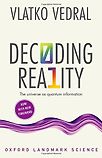
Quantum Physics by Alastair Rae
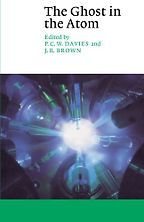
The Ghost in the Atom by Paul Davies
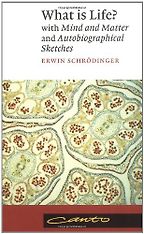
What is Life? by Erwin Shroedinger
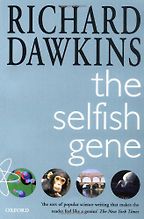
The Selfish Gene by Richard Dawkins
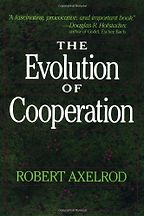
The Evolution of Cooperation by Robert Axelrod
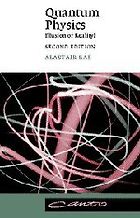
1 Quantum Physics by Alastair Rae
2 the ghost in the atom by paul davies, 3 what is life by erwin shroedinger, 4 the selfish gene by richard dawkins, 5 the evolution of cooperation by robert axelrod.
Y our first book is Quantum Physics: Illusion or Reality? by Alastair Rae.
There are all kinds of strange views on what quantum physics actually is.
Right. There are connections with religion, then there are extremes saying it’s all in the mind: basically that nothing becomes real until we measure it and look at it and consciously record it. On the other side there is a point of view that it’s as real as anything else, out there independently of us and so on. He talks about these two extreme views and what quantum physics tells us about this very old question: whether the world is ideal or real.
Does he resolve it?
Your second book?
The Ghost in the Atom. This was actually a sequence of radio interviews recorded by Paul Davies, who’s probably the best populariser of physics we have.
He’s the Search for Extra-Terrestrial Intelligence guy?
Right. He’s written a book about that as well. I think in the 70s/80s he conducted a set of radio interviews with about 10 of the leading physicists of the time. And the spirit is similar to the previous book in that it’s all to do with how we understand the unusual phenomena in quantum physics. The book is written as a dialogue – Davies asks a question and then the interviewee answers – and I would say this format is a much more exciting read than typical prose where someone exposes something. It also goes into personal issues, which you usually don’t get in these books, in that he asks each person about how they got engaged, when did they first learn about quantum mechanics, how did they learn it? It’s really fantastic, an amazing read.
To whom does he speak?
People like John Bell, who came up with Bell’s Inequality, which was one way of quantifying the weirdness in quantum mechanics; then David Bond who has one of those interpretations that tries to retain, I would say, some kind of reality in quantum mechanics, arguing that the world is still as real as it was in a Newtonian kind of framework. Davies chose a person to represent each of these points of view, and it’s really interesting how the interview is conducted and then where it leads – how different people end up in completely different parts of quantum physics, and what they find exciting, and so on.
Does it lead you to believe that maybe people go into quantum physics to prove an idea that they’ve already had?
That’s an interesting point. It’s difficult to tell what comes prior to what, right? In a way we do have these inner feelings, all of us, as to what we think the world should be like. And we usually carry this prejudice with us into our research as well, so it’s not clear whether you come with a prejudice and then you’re trying to use this theory to confirm what you already thought the world was like prior to that. In this kind of interview it’s easy to expose these kinds of things: you can see that people started with some ideas and then maybe changed them or didn’t change them as they did research.
All these unifying theories that quantum mechanics proves, seem to have already been posited in literature or religion or whatever.
Your next book?
In physics we always study simple, inanimate objects, so physicists find it very difficult to understand, for example, weather patterns, or financial markets. Anything that’s more complicated, it seems that we don’t have the same grasp that we have with atoms or things like that, so I think that’s exactly where I would like to go to with the next three books. Firstly, What is Life? by Erwin Schroedinger. He was one of the founding fathers of quantum mechanics in the 1920s and then in the 1940s he began to think about biology. At that time the big problem was how biological information is encoded. This is just before Watson and Crick found the structure of DNA and explained the whole thing. About ten years before though, Shroedinger asked this question: can I take this very simplistic way we have of thinking in physics, namely that we like to reduce everything to a very simple mathematical formula (which seems to work actually pretty well) and take that over to biology and start to understand some more complicated processes within a cell, or maybe even light propagation, in terms of physics? The interesting thing there is that he concludes somewhere that classical Newtonian mechanics is probably not sufficient to understand biological things, and we might have to use the full quantum mechanics to understand that. And he comes so close to getting the right mechanism for propagating biological information that he almost managed to scoop Watson and Crick.
He got as far as the idea of a building block?
This is really extremely famous and I think rightly so – The Selfish Gene, Richard Dawkins: I love that book. When you look at theories in physics, they are really phrased very precisely with mathematical formulae, and if you are trying to make a prediction of a physical system you can do this extremely well with very high precision. So, for example, if you want to know where Mars will be in 10,000 years’ time, then our laws of physics are so accurate that actually you can really do that to an extremely good precision. However, when you look at more complicated things like biology and you want to say: well, can I look at a species and say what’s going to happen in terms of evolution in 10,000 years, then of course it’s very difficult, and I don’t think anyone has a clue how to make this more mathematical. But the first time I saw how far you can go, and I was really surprised, was with The Selfish Gene. Because the theory of evolution seems to a physicist much less rigorous than any theory that we have in physics – it just doesn’t have the power to predict things in the same way. You’ve got these two basic principles – the random mutation of the genetic material, and then the subsequent deliberate selection by the environment of whether the resulting individual survives or doesn’t survive these genetic modifications. Dawkins’s book was the first time that someone tried to make the theory very mathematical, and explain it fully, and tried to make predictions based on it.
Your last book?
We can explain living systems scientifically very well, but what about human beings? What about the mind? I don’t think we have any ideas in science really how to attack this problem. Because, even defining what the mind or consciousness is, this is still completely open, and in science we have to have a good definition. So now we are not talking about biology any more; we are really talking about sociology. Can we explain interactions between human beings, between societies, with a similar logic to what we used to explain biology for example? The book that made a huge difference there and generated a whole field in sociology and economics is called The Evolution of Cooperation by Robert Axelrod. It’s also a popular book with no equations, but basically the point he is making is that you can use exactly the same mathematics we use in physics and in biology to start to attack more complicated things like this cooperation issue. If you link it back to The Selfish Gene, which claims that underlying human behaviour is this selfishness of genes in some sense, then, of course, any cooperative behaviour becomes a mystery. Why do we ever actually cooperate with each other? Why do we have this built in? And why do societies or tribes cooperate with other tribes and other societies? Axelrod really tries to explain this in this book, which generated this whole field of taking the game theory of mathematics and trying to apply it to the social context to understand conflict and cooperation and so on.
What does he discover?
I think that even if you have an underlying selfish tendency, then cooperation can evolve simply because you’re forced to interact with someone else over and over again. If you interact with someone just once, then there is no incentive to cooperate. But if you know that you’ll be interacting with a person over and over again, where you can check and verify what the other person is doing, and, crucially, if you don’t know how long this interaction will last, then somehow mathematics would suggest that it’s better for you to switch to cooperation rather than to continue to be selfish. He goes through lots of computer simulations and also experiments with people and some animal species to show that cooperation can evolve. So in a way it’s a very optimistic book in that sense: even though we know the first instinct is to protect your own interest, somehow it seems that evolution would really favour cooperation.
Doesn’t that depend on the context? At Goldman Sachs you can interact every day and still act selfishly.
Right. The point is that we’re really at the very beginning of trying to apply the same logic to complex systems, and maybe ultimately it’s impossible to fully grasp and explain and predict them. But somehow books like this made me feel a bit more encouraged that this might be possible.
This interview was first published in 2010.
December 17, 2012
Five Books aims to keep its book recommendations and interviews up to date. If you are the interviewee and would like to update your choice of books (or even just what you say about them) please email us at [email protected]
Support Five Books
Five Books interviews are expensive to produce. If you've enjoyed this interview, please support us by donating a small amount .
Vlatko Vedral
Vlatko Vedral is Professor of Quantum Information Theory at the Universities of Oxford and Singapore. He has published over 100 research papers in quantum mechanics and quantum information and was awarded the Royal Society Wolfson Research Merit Award in 2007. He has held a Professorship at Leeds, visiting professorships in Vienna and Singapore (NUS) and at Perimeter Institute in Canada. He is the author of Decoding Reality: The Universe as Quantum Information .
We ask experts to recommend the five best books in their subject and explain their selection in an interview.
This site has an archive of more than one thousand seven hundred interviews, or eight thousand book recommendations. We publish at least two new interviews per week.
Five Books participates in the Amazon Associate program and earns money from qualifying purchases.
© Five Books 2024
Quantum Physics Made Simple
Best Quantum Physics Books: Top Picks for Beginners and Experts Alike
Quantum physics is a fascinating and complex subject that has been the subject of many books. These books can help readers gain a deeper understanding of quantum mechanics, quantum field theory, and other related topics. Whether you are a student, researcher, or simply an enthusiast, there are many great quantum physics books out there to choose from.
When looking for the best quantum physics books, it is important to consider your level of knowledge and expertise. Some books are written for beginners and provide a gentle introduction to the subject, while others are more advanced and assume a certain level of prior knowledge. Additionally, you may want to consider the specific area of quantum physics that interests you, such as quantum computing, quantum entanglement, or quantum field theory.
One critical factor to consider when choosing a quantum physics book is the author’s expertise and credentials. Look for books written by respected physicists or researchers in the field who have a deep understanding of the subject matter. Additionally, consider the book’s organization, clarity, and level of detail, as well as any accompanying illustrations or diagrams that may help you better understand the concepts.
We have spent countless hours researching and testing the top quantum physics books on the market to identify the ones that provide the most comprehensive and accessible coverage of this fascinating subject. Whether you are a beginner or an expert, our list of the best quantum physics books will help you expand your knowledge and deepen your understanding of this exciting field.
Best Quantum Physics Books
If you’re interested in the fascinating world of quantum physics, there’s no better way to learn about it than by reading a great book. We’ve put together a list of the best quantum physics books that are perfect for beginners and experts alike. Whether you’re looking for an introduction to the subject or want to dive deeper into the complex theories and concepts, these books will take you on a journey through the fascinating world of quantum physics.
Quantum Physics for Beginners

If you’re looking for a beginner-friendly introduction to quantum physics, this book is a great choice that covers a variety of topics in a simplified manner
- Provides a simplified explanation of quantum physics and mechanics principles
- Covers a variety of sub-fields and theories within quantum physics
- Easy to understand for someone with limited education involving physics
- Some readers have reported grammatical errors and poor illustrations
- The print is quite large, but the pages are small, so there is not much content per page
- May not be suitable for readers with a higher level of knowledge in physics
Overall, Quantum Physics for Beginners is a great option for those who are new to quantum physics and want to learn more about the subject in an easy-to-understand way. The book covers a variety of topics and provides a simplified explanation of quantum physics and mechanics principles. However, some readers have reported grammatical errors and poor illustrations, and the print is quite large with small pages, so there is not much content per page. Additionally, this book may not be suitable for readers with a higher level of knowledge in physics.
Quantum Physics and The Power of the Mind
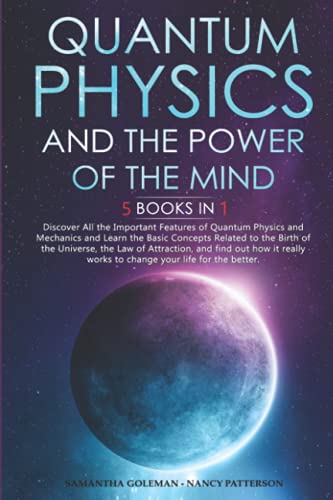
If you’re interested in learning about quantum physics and the law of attraction, Quantum Physics and The Power of the Mind is a great book to consider. It’s an informative and engaging read that dives deep into these fascinating topics.
- Provides a comprehensive overview of quantum physics and the law of attraction
- Easy to understand explanations of complex concepts
- Includes practical exercises and techniques to help you apply what you’ve learned
- Some readers may find the book overly simplistic
- Not suitable for those looking for a more technical or academic approach to quantum physics
- Some typos and errors in the text
Quantum Physics and The Power of the Mind is divided into five sections, each of which explores a different aspect of quantum physics and the law of attraction. The book starts by introducing the basic principles of quantum physics and mechanics, before diving into more advanced topics like quantum entanglement and the observer effect.
One of the standout features of this book is its emphasis on practical applications. Each section includes exercises and techniques that you can use to apply the concepts you’ve learned to your own life. Whether you’re looking to attract more abundance, improve your relationships, or simply deepen your understanding of the universe, this book has something to offer.
Overall, Quantum Physics and The Power of the Mind is a great choice for anyone looking to learn more about quantum physics and the law of attraction. While it may not be the most technical or academic book on the subject, it’s an engaging and informative read that provides a solid foundation for further exploration.
Existential Physics: A Scientist’s Guide to Life’s Biggest Questions

If you’re looking for an entertaining and insightful read on the biggest questions in life, Existential Physics is a great choice.
- Author Sabine Hossenfelder provides clear and amusing explanations of complex physics concepts, making them accessible to laypeople.
- The book covers a wide range of topics, including the nature of time, the origins of the universe, and the role of consciousness in physics.
- Hossenfelder’s writing style is engaging and entertaining, making the book a pleasure to read.
- Some readers may find the book’s philosophical musings to be overly speculative and not grounded enough in empirical evidence.
- The book’s focus on existential questions may not be of interest to readers who are primarily interested in learning about quantum physics.
- The book can be dense at times, requiring readers to take their time and carefully absorb the material.
Overall, Existential Physics is a fascinating and thought-provoking read that is well worth the investment of time and money. Whether you’re a physics enthusiast or just someone who enjoys pondering the big questions in life, this book is sure to provide plenty of food for thought.
Hossenfelder’s writing style is witty and engaging, and she does an excellent job of breaking down complex concepts into understandable language. The book covers a lot of ground, from the basics of quantum mechanics to the latest theories about the nature of reality. Along the way, Hossenfelder offers her own insights and opinions on a range of topics, making the book feel like a conversation with a knowledgeable friend.
That said, some readers may find the book’s philosophical musings to be overly speculative and not grounded enough in empirical evidence. Additionally, the book’s focus on existential questions may not be of interest to readers who are primarily interested in learning about quantum physics.
Something Deeply Hidden: Quantum Worlds and the Emergence of Spacetime

If you’re interested in quantum physics and want to learn more about the Many-Worlds interpretation, then Something Deeply Hidden is the book for you. Sean Carroll does an excellent job of explaining complex concepts in an easy-to-understand way.
- Carroll’s writing style is engaging and easy to follow.
- The book provides a comprehensive overview of the Many-Worlds interpretation.
- Carroll doesn’t shy away from the more technical aspects of quantum physics, but he explains them in a way that’s accessible to non-scientists.
- Some readers may find the book too technical or dense.
- The Many-Worlds interpretation is still a controversial topic in the field of physics, so readers who disagree with Carroll’s views may not find the book as enjoyable.
- At 368 pages, the book is not a quick read.
Something Deeply Hidden is an excellent choice for anyone looking to deepen their understanding of quantum physics and the Many-Worlds interpretation. Carroll’s writing style is engaging and accessible, making complex concepts easy to understand. While the book may be too dense for some readers, those who are interested in the topic will find it well worth their time.
Quantum Physics and the Power of the Mind

If you’re looking for a beginner’s guide to quantum physics and the Law of Attraction, Quantum Physics and the Power of the Mind is a great option.
- Clear explanations of quantum mechanics and the Law of Attraction
- Easy to understand for those without a background in physics
- Provides a foundation for further learning about quantum physics
- Some readers may find the content too basic
- Not as scientific as some readers may expect
- Some readers may find the writing style unengaging
Quantum Physics and the Power of the Mind is a concise and accessible introduction to the world of quantum mechanics and the Law of Attraction. The book covers the basic principles of quantum physics, including wave-particle duality, entanglement, and superposition, and explains how these ideas relate to the Law of Attraction. The author also provides practical tips for using the Law of Attraction to manifest your desires.
The book is well-written and easy to understand, making it a great choice for those without a background in physics. However, some readers may find the content too basic, and the writing style may not be engaging enough for some. Overall, if you’re looking for a beginner’s guide to quantum physics and the Law of Attraction, Quantum Physics and the Power of the Mind is a solid choice.
Publication date: December 7, 2020. Print length: 126 pages. Best Sellers Rank: See Top 100 in Books. Dimensions: 5 x 0.29 x 8 inches. Item Weight: 5.1 ounces. ISBN-13: 979-8577932152. Paperback: 126 pages. Language: English. Publisher: Independently published (December 7, 2020). ASIN: B08PXK551S.
Buying Guide
Choosing the right quantum physics book can be a daunting task, especially for those new to the subject. Here are some factors to consider when selecting the best book for your needs:
The author’s credentials and experience in the field of quantum physics should be taken into account. Look for books written by authors with a background in physics or related fields, such as mathematics or engineering.
Level of Difficulty
Consider your level of familiarity with quantum physics when selecting a book. If you are a beginner, look for books that provide a clear introduction to the subject with easy-to-understand explanations. On the other hand, if you are an advanced student or researcher, you may want a book that delves deeper into the subject matter.
Content and Focus
Consider the specific topics covered in the book and whether they align with your interests and needs. Some books may focus on the history and development of quantum physics, while others may delve into the mathematical and theoretical underpinnings of the subject. Determine what you hope to gain from reading the book and choose accordingly.

Reviews and Recommendations
Reading reviews and seeking recommendations from others in the field can be helpful when selecting a quantum physics book. Look for reviews from reputable sources and seek recommendations from professors, colleagues, or other experts in the field.
Finally, consider the price of the book when making your selection. While some textbooks and reference materials can be expensive, there are also many affordable options available. Consider whether the book is a worthwhile investment and fits within your budget.
Search the site
in the guardian : david kaiser selects the top ten books on quantum physics .
Now over a century old, quantum theory remains one of the most beguiling concepts in physics. David Kaiser, MIT Germeshausen Professor of the History of Science, and Senior Lecturer in Physics, names his 10 favorite books on the subject, from Richard Feynman's introductory lectures to Chad Orzel's How to Teach Physics to Your Dog.
Article at The Guardian
More From Forbes
Great books for non-physicists who want to understand quantum physics.
- Share to Facebook
- Share to Twitter
- Share to Linkedin
A few times last week at the Schrödinger Sessions workshop, I made reference to books that I think do a good job with particular aspects of quantum physics (in addition to the one that I wrote , that is...). At the end of the workshop, some of the writers asked if I had a list of those. A couple of them made the list of recommended science books for non-scientists that I posted here back in April, but I don't seem to have a quantum-specific list. So let's fix that...
What follows is a selection of popular-audience books on quantum physics that I think are particularly good in one way or another. This is not an exhaustive list, by any means, just a personal selection from the subset of pop-quantum books that I happen to have read. I'll group these loosely by the general approach they take.
Historical Narrative
One common approach to explaining quantum physics is to approach it through the history of the subject, and the many colorful personalities involved. Uncertainty by David Lindley is an excellent compact example of this, focusing on the origin of the Heisenberg Uncertainty Principle and the many debates between Albert Einstein and Niels Bohr over the philosophical foundations of quantum theory. It covers a bit more of the "Old Quantum Theory" period (between the Bohr model of hydrogen in 1913 and full QM in 1927) than usual, and does a good job showing how Bohr and Einstein were often talking past each other.
Louisa Gilder's The Age of Entanglement covers some of the same territory in a bit more detail, and stretches forward into the 1970's and the first experimental tests of entanglement. Gilder builds her book around "conversations" between key figures with the dialogue drawn from their letters and other writings, which works very well.
The Second Creation by Charles Mann and Robert Crease is a more scholarly/journalistic approach to the development of quantum physics, based on extensive interviews with the surviving quantum pioneers and their associates. I also like this book a lot because it emphasizes the key role of experiments, including things like cosmic ray observations that are often left out of modern presentations.
Frank Close's The Infinity Puzzle is a history of the development of the Standard Model, including the development of QED, the unification of the weak and electromagnetic forces and what's now called the Higgs mechanism for giving mass to particles. This book was particularly interesting in that it details the many false steps and missed opportunities along the way, so it's great for getting the process of science as well as the core physics.
How the Hippies Saved Physics by David Kaiser is, as the title promises, a highly readable look at the role counterculture and "New Age" thinking played in sparking the renewed interest in quantum foundations that started in the 1980's and has exploded into the modern field of quantum information. While none of their colorful attempts to explain ESP through quantum phenomena actually pan out, showing why they can't work proved surprisingly fruitful.
The other big category of pop-quantum books that I like are those that explain how known physics works. In this vein, I'm very fond of Robert Oerter's The Theory of Almost Everything , a compact survey of the Standard Model of particle physics, the collection of particles and forces that make up everything we know about physics. This is an enormously successful theory, often skipped lightly over on the way to more speculative and exotic topics, and Oerter's book does a nice job of putting it front and center.
Dance of the Photons by Anton Zeilinger is an excellent treatment of the physics of entanglement in the context of quantum optics. Zeilinger is a major figure in this field-- his name regularly comes up when people try to guess the next Nobel prize in physics-- and this is an excellent treatment. I particularly like the way it walks the reader through looking at "real" data, to see how the spooky correlations of entanglement emerge from measurements of polarized photons.
And it would be irresponsible to mention any book by a major figure without also citing Richard Feynman's QED , based on a series of lectures he gave in the early 1980's. This is one of the best explanations you'll find of the ideas behind quantum electrodynamics, written by one of its founders. Feynman's reputation is outsized enough to generate occasional backlash, but he genuinely was a brilliant dude and an exceptional communicator, and this book shows both of those.
Finally, if you don't mind some math with your explanations, Quantum Mechanics: The Theoretical Minimum by Leonard Susskind and Art Friedman gets into the details of quantum physics from the information side of things, rather than wave-particle duality. It's based on a course Susskind has taught for many years, and has a lot of equations in it, but it's very smoothly presented, and the particular approach they use gets at some deep ideas with minimal pain.
And as long as I'm mentioning something on the textbook-y side, I once used The Quantum Challenge by George Greenstein and Arthur Zajonc for a class on quantum optics. This makes use of a good deal of math, including more explicit calculus than the Susskind and Friedman, but is an excellent overview of great experiments in the field of quantum optics testing the reality of all those weird predictions about photons and entanglement.
Digging Deeper
Finally, a couple of books that are more speculative, starting with Quantum Enigma: Physics Encounters Consciousness by Bruce Rosenblum and Fred Kuttner. One of the less beneficial things to come out of the quantum revolution was the idea that quantum measurement requires a "conscious observer" in some way. This idea is so vague as to be unworkable and has mostly dropped out of real physics, but was picked up by a lot of, well, the sort of quasi-hippies in Kaiser's book above. This has led to a lot of really crazy stuff being written about the role of consciousness in quantum physics and vice versa; this book is one of the few non-crazy takes on the subject that I've seen.
And, finally, I'll close this list with Amanda Gefter's Trespassing on Einstein's Lawn , a whirlwind survey of more speculative topics-- getting well beyond "normal" low-energy quantum physics to talk about black holes and that sort of thing-- wrapped up in a personal narrative. This gets into some heavy ideas, but Gefter's voice and enthusiasm for the topic are charming enough to carry it off.
So, that's a quick list of a dozen books that I think do a good job of making the central ideas of quantum physics accessible to a broader audience (well, reasonably so-- a couple are not for the math-phobic...). Again, this is my personal take, and not an exhaustive list; there are a whole lot of books out there on the subject, and I haven't come close to reading all of them. Feel free to recommend others in the comments.
- Editorial Standards
- Reprints & Permissions

On the site
- technology & engineering
Mastering Quantum Mechanics
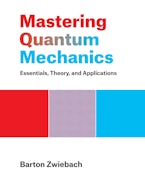
Essentials, Theory, and Applications
by Barton Zwiebach
ISBN: 9780262046138
Pub date: April 12, 2022
- Publisher: The MIT Press
1104 pp. , 8 x 10 in , 248 b&w illus.
ISBN: 9780262366892
eTextbook rental
4 months: $55.00, 12 months: $77.00.
- 9780262046138
- Published: April 2022
$110.00
- 9780262366892
$109.99
- Amazon.co.uk
- Bookshop.org
- Waterstones
Other Retailers:
- MIT Press Bookstore
- Penguin Random House
- Barnes and Noble
- Books a Million
- Description
A complete overview of quantum mechanics, covering essential concepts and results, theoretical foundations, and applications.
This undergraduate textbook offers a comprehensive overview of quantum mechanics, beginning with essential concepts and results, proceeding through the theoretical foundations that provide the field's conceptual framework, and concluding with the tools and applications students will need for advanced studies and for research. Drawn from lectures created for MIT undergraduates and for the popular MITx online course, “Mastering Quantum Mechanics,” the text presents the material in a modern and approachable manner while still including the traditional topics necessary for a well-rounded understanding of the subject. As the book progresses, the treatment gradually increases in difficulty, matching students' increasingly sophisticated understanding of the material.
Part 1, on essentials, offers a sound introduction to the subject, touching on such topics as states and probability amplitudes, the Schrödinger equation, energy eigenstates of particles in potentials, the hydrogen atom, and spin one-half particles. Part 2, on theoretical foundations, covers mathematical tools, the pictures of quantum mechanics and the axioms of quantum mechanics, entanglement and tensor products, angular momentum, and identical particles. Part 3, on applications, introduces tools and techniques that help students master the theoretical concepts with a focus on approximation methods. About 240 exercises appear throughout the text, and nearly 300 end-of-chapter problems support the understanding of the subject. After mastering the material in this book, students will have the strong foundation in quantum mechanics that is required for graduate work in physics.
Barton Zwiebach is Professor of Physics at MIT. His research is in theoretical particle physics and string theory, and he is the author of the undergraduate textbook A First Course in String Theory . The creator and lead instructor for the popular MITx “Mastering Quantum Mechanics” course, he taught undergraduate quantum mechanics at MIT from 2010 to 2020.
“Zwiebach's book stands out from the many other undergraduate quantum textbooks on the market in the unmatched clarity and attention to detail of the exposition, as well as in its coverage of important modern topics like quantum computation and information.” Matthew Headrick, Professor of Physics, Brandeis University
Additional Material
Errata list for Mastering Quantum Mechanics
OpenCourseWare Quantum Physics I
OpenCourseWare Quantum Physics II
OpenCourseWare Quantum Physics III
Barton Zwiebach's edX Courses
Table of Contents
Related Books
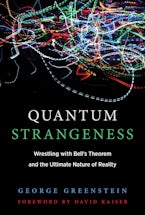

Top 10 Quantum Physics Books for the Self Learners
- Book List , Physics
- December 25, 2023

Quantum physics, a fascinating and complex field of study, can often seem like an insurmountable challenge for the novice learner. Yet, with the right resources, anyone can delve into this intriguing world of particles, quantum states, and wave-particle duality. For those eager to embark on this journey, I have compiled a list of the top 10 quantum physics books that brilliantly blend scientific intricacies with lucid explanation. These books cater to a range of readers, from the curious beginner to the seasoned physicist, providing a remarkable balance of depth and accessibility.
This selection of quantum physics books, tailored for a general audience, represents personal favorites that have stood out in one way or another. Remember, this is not an exhaustive list, but a curated collection from the spectrum of popular quantum physics literature that I’ve gotten some recommendations from the experts.
Table of Contents
10 Quantum Physics Books for Avid Learners

The list below contains 10 quantum physics books that provide a compelling discourse on quantum reality. These texts meticulously explore why quantum reality is logical, what the opposing viewpoints are, and the very essence of quantum reality. They delve into the fundamental principles of quantum physics, debunking common misconceptions, and challenging traditional perspectives with innovative theories.
These quantum physics books serve as a comprehensive resource for readers, breaking down complex quantum phenomena into understandable concepts, and presenting a coherent picture of the quantum world. From examining the philosophical implications of quantum theory to showcasing its practical applications, these books promise a captivating journey through the marvels of quantum reality.

The Quantum Challenge: Modern Research on the Foundations of Quantum Mechanics
“The Quantum Challenge: Modern Research on the Foundations of Quantum Mechanics” by George Greenstein is an amazing book that explores the mind-bending concepts of quantum mechanics and how they challenge our understanding of the physical world.
While these topics are usually reserved for scientists, this book is designed to make them accessible to students of physical science, mathematics , and engineering . The new second edition digs deep into the profound questions of quantum mechanics, helping readers develop a deeper understanding and appreciation for this fascinating field.
Whether you’re a student, teacher, or just someone curious about the mysteries of the universe, this book is a must-read for anyone interested in quantum physics. Get ready to be amazed!

Modern Quantum Mechanics
A comprehensive and captivating post-graduate text on non-relativistic quantum mechanics. Assumes prior knowledge of quantum mechanics basics at the undergraduate level. Requires familiarity with classical electromagnetism, Lagrangian and Hamiltonian mechanics, as well as a strong foundation in linear algebra, vector calculus, and vector spaces.
The book is dense and technical, but the explanations are clear, interesting, and supported by experimental results. Intuition is provided when relevant. Gaps in derivations enhance understanding. The exercises are pedagogically appropriate and at the right difficulty level. However, this book requires focus, time, and close reading to complete the missing derivation steps.
The chapters on linear algebra, Dirac notation, theory of angular momentum, and Feynman path integrals are exceptional. The author delves deep into these subjects with elegance. The “Heisenberg picture” and Ehrenfest theorem are brilliantly derived. The treatment of spin precession and symmetries is also noteworthy.
The only drawback is the excessive focus on perturbation theories. Additionally, some notational choices are unconventional and not very helpful.
Overall, this demanding but rewarding book is highly recommended, serving as a valuable reference text as well.

The Ghost in the Atom: A Discussion of the Mysteries of Quantum Physics
Quantum mechanics can be mind-bogglingly complex. Even after reading this book twice, I still struggle to fully grasp the intricate details behind the Aspect experiment, let alone the mathematics that support it and its deeper implications. However, that is not the main focus of this book. Its purpose is to shed light on the controversies and differing interpretations of quantum mechanics for a wider audience.
Considering that quantum mechanics is one of the most successful scientific theories ever, with its ability to predict experimental results, it is only natural for physicists to seek a deeper understanding of its physical meaning. But interpreting quantum mechanics is no easy task and can even challenge traditional physics principles.
This book is quite dated, so it is advisable to explore more recent perspectives on Quantum Mechanics to see if any progress has been made in resolving these issues.

Quantum Physics: Illusion or Reality
If you want to truly grasp the concepts of quantum mechanics, this book may not be the best choice. However, if you have some background knowledge and are curious about the quantum world as a non-specialist, this is the perfect book for you!
The author effectively simplifies the complexity of quantum mechanics, using diagrams to aid in understanding. While I had to look up Bell’s theorem on the internet, overall the author does a great job of explaining the strangeness of the quantum world and the meaning behind experimental results.
But the real gem of this book begins in the fourth chapter, where the author delves into the measurement problem and the various interpretations of quantum mechanics, such as Copenhagen’s interpretation , the multiverse theory, GRW theory, thermodynamic irreversibility, and consistent histories. This section alone deserves a 5-star rating.
Starting from the fifth chapter, the book seamlessly combines physics and philosophy , exploring each interpretation from a scientific standpoint and delving into the implications they have on our understanding of reality.
Discover the mind-boggling world of quantum physics and its profound implications on our perception of reality in this captivating book.

The Age of Entanglement: When Quantum Physics Was Reborn
Discover the fascinating world of quantum entanglement in this captivating book. Delve into the concept that forever connects two things regardless of distance, and explore its complex nature through the eyes of scientists who pushed the boundaries of quantum physics.
“The Age of Entanglement” is not just a book about conversations; it’s a journey through time, recounting the evolution of this groundbreaking theory. Drawing from an array of sources including journals, letters , and articles, author Louisa Gilder weaves fact and fiction together, taking us on a mesmerizing exploration of scientific progress.
Gilder humanizes the physicists involved, providing insight into their quirks and flaws, as well as their relentless pursuit of knowledge. Through their shared pursuit, these scientists become entangled themselves, alternately supporting and questioning each other’s work. Egos collide, hero worship emerges, and Gilder’s fictional contributions bring these relationships to life.
By focusing on renowned figures such as Bohm, Bohr, Schroedinger, and Bell, Gilder demonstrates how quantum leaps were made in this field. Personal touches, casual conversations, and moments of brilliance amidst triviality make “The Age of Entanglement” a truly captivating read.
While Gilder’s extensive collection of sources may seem overwhelming, she skillfully organizes them in a way that both average readers and scientists can appreciate. Eavesdropping on real and imagined conversations is both educational and enjoyable, providing a unique perspective on the inner workings of scientific minds.
Through her masterful storytelling, Gilder not only retraces the history of entanglement but also reveals the critical role that these personalities played in shaping the theory. It is their brilliance and ingenuity that have brought us the theory as we know it today.
“The Age of Entanglement” is a must-read for anyone intrigued by the mysteries of quantum physics . Join Gilder on this incredible journey of discovery and gain a deeper understanding of the minds behind the science.

Quantum Reality: Beyond the New Physics
Discover the mind-bending world of quantum “reality” in this captivating book by Nick Herbert. While many focus on quantum theory, Herbert emphasizes the distinction between theory and reality.
Curious about the Bell Theorem ? Look no further! Herbert takes readers on a journey, building a foundation of understanding before delving into this famous theorem. Through a simple experiment called the Blue, Green experiment, he demonstrates how rotating a photon detector can influence the results thousands of miles away.
This groundbreaking discovery, predicted by quantum theory, challenges the limits of our understanding. Physicists have struggled to accept the implications of the Bell Theorem, resorting to alternate explanations and ignoring its profound significance. Herbert candidly explores these attempts and reveals the inadequacy of the disturbance model.
Accessible to both scientists and laymen alike, Quantum Reality: Beyond the New Physics provides a clear and concise exposition of the Bell Theorem. A must-have addition to any library!

What Is Real?: The Unfinished Quest for the Meaning of Quantum Physics
Discover the captivating history of quantum physics and why the Copenhagen interpretation has stood the test of time in What is Real? This compelling book is a must-read not only for professional physicists, but for anyone interested in the fascinating world of science.
With a solid overview of quantum theory and its various interpretations, What is Real? also delves into the sociological history of the field, offering insights from both European and American perspectives. Here, you’ll learn about the science itself, the practice of scientific inquiry, and the philosophy of science.
Author Becker emphasizes the collaborative nature of science, shedding light on the obstacles of human pettiness, political bias, and hyper-specialization that can hinder progress. However, this is not an attack on science by any means. Becker distinguishes between healthy criticism within the scientific community and the dangerous territory of anti-science movements like creationism or climate change denial.
Sprinkled with fascinating anecdotes and stories about the scientists and the historical context, What is Real? remains focused on the bigger questions it seeks to answer. It offers a diverse and interdisciplinary exploration of the practice of 20th century physics , highlighting the remarkable progress made in a short span of time.
Accessible to all readers, no prior knowledge of quantum theory is necessary. Becker presents the concepts in an engaging manner, free of complex math, and his writing is smooth and focused. Prepare to be entertained and enthralled by this page-turner of a popular science book.

The Quantum Dissidents: Rebuilding the Foundations of Quantum Mechanics
In “The Quantum Dissidents,” Olival Freire Junior offers an intriguing take on quantum physics. With a mix of academic rigor and captivating storytelling, this book sheds light on the pioneers who questioned the status quo. Their inquiries ultimately paved the way for the development of quantum information, which is now revolutionizing our understanding of computation. As quantum computers surpass classical ones, the influence of these early explorers becomes undeniable. If you’re fascinated by the lesser-known historical aspects of quantum physics, this book is a must-read.

Introduction to Quantum Mechanics
Looking for a comprehensive and engaging guide to quantum mechanics? Look no further. “Introduction to Quantum Mechanics” is a game-changer.
What sets this textbook apart is its unique approach. Unlike others, it dives straight into the mathematical formalism from the get-go. Brace yourself for mind-boggling equations right from the first page. But fear not, because author Griffiths expertly breaks down complex concepts into digestible portions.
While the book does involve a fair amount of mathematics (it is quantum mechanics, after all), Griffiths doesn’t dwell on complete derivations for everything. He trusts that you can handle it and provides references for further exploration. And trust me, you’ll appreciate the streamlined approach. Quantum mechanics is complex, and this book focuses on giving you a solid understanding without overwhelming you with unnecessary details.
To truly benefit from this gem, embrace the challenge of problem-solving. The more exercises you tackle, the deeper your grasp of the material will be. A solutions manual is readily available online, making it easier to put your newfound knowledge to the test.
Years later, I still find myself turning to this textbook as a trusted reference in my professional life.
In summary: “Introduction to Quantum Mechanics” is an excellent book that will require dedication and effort. But the rewards? Mind-blowing.

QED: The Strange Theory of Light and Matter
Discover the remarkable world of Quantum Electrodynamics (QED) – the fascinating field that explores the interactions between light and matter. In this must-read book , renowned physicist Richard Feynman offers his unique insights into the subject he has personally contributed to, earning him a Nobel prize.
While Feynman aims to make the concepts accessible, it may not be suitable for absolute beginners. However, for those with a basic understanding of physics , the lucid explanations provide a fresh perspective and “aha” moments of understanding.
At just 150 pages, the book is concise but leaves readers hungry for more. Although it refrains from delving into complex math, some mathematical background would enhance the explanations in certain areas.
Although not perfect, QED is an excellent read for physics enthusiasts and anyone curious about how the world works. Don’t miss out on this enlightening journey!
Who is the king of quantum physics?
What should i study if i like quantum physics, is quantum physics actually hard, what books should i read for quantum physics, did einstein believe in quantum physics.

POPULAR LISTS

Top 10 Statistics Textbooks for Effective Self Study
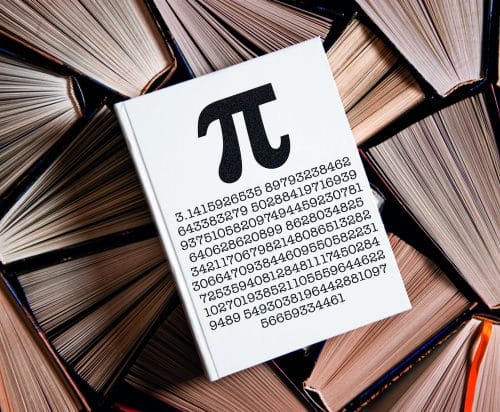
7 Utterly Well-written Math Books About Pi

Patterns of the Infinite: Top 10 Islamic Geometry Books

15 Best Educational Wooden Building Blocks For Kids

48 Springer Biographies About Remarkable Scholars and Innovators

59 Mind-Blowing Math Talks That Can Change Your Perspective on Life
Related lists.

Eight Beautiful Math Posters that Make You Love Mathematics
- 11 April 2021 ·
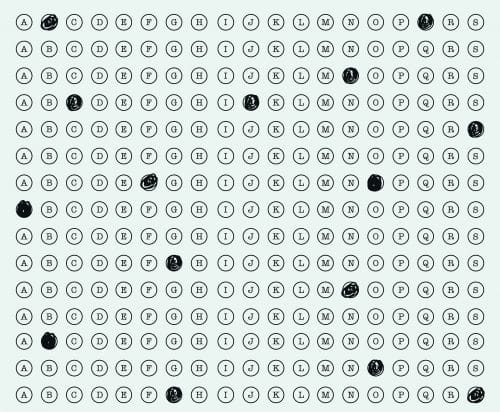
- Education ,
- Mathematics ,
13 Official ACT Practice Tests | Full-Length & Free
- 4 January 2022 ·
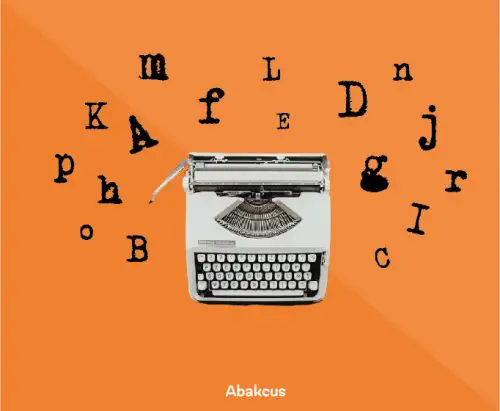
10+ Best Useful Writing Tools for Math and Science Bloggers
- 12 March 2021 ·
- About Abakcus
- Terms of Service
Best Quantum Theory Books of 2024

* We independently evaluate all recommended products and services. If you click on links we provide, we may receive compensation.
Quantum Theory Books offer a wide range of literature on the complex and fascinating subject of quantum physics. From introductory guides to advanced textbooks, these books provide readers with a thorough understanding of the principles and theories that underpin this field of study. Whether you're a beginner looking to learn the basics or an experienced researcher searching for cutting-edge insights, Quantum Theory Books has something for everyone. With clear, concise writing and helpful diagrams and illustrations, these books are perfect for anyone interested in exploring the mysteries of the quantum world.
At a Glance: Our Top Picks

Top 10 Quantum Theory Books
Quantum supremacy: how the quantum computer revolution will change everything.
Quantum Supremacy by Michio Kaku is a fascinating exploration of the potential of quantum computing to revolutionize industries and solve some of the world's biggest problems, from climate change to incurable diseases. Kaku's signature clarity and enthusiasm make this an exhilarating tour of humanity's next great technological achievement. The book highlights the race to claim humanity's future and how quantum computing could change every aspect of our daily lives. Overall, Quantum Supremacy is a must-read for anyone interested in the future of technology and its impact on our world.
Quantum Physics and the Power of the Mind
This book, "Quantum Physics and the Power of the Mind," is an excellent guide for beginners who want to understand the basics of quantum physics and the law of attraction. It covers a wide range of topics, including the origins of the universe, the fundamentals of quantum physics, and how quantum physics affects our daily lives. The book is written in a simple and easy-to-understand language, making it accessible to anyone who wants to learn more about this fascinating subject. Overall, this book is a must-read for anyone who wants to gain a deeper understanding of the universe and how it works.
Quantum Physics for Beginners: From Wave Theory to Quantum Computing. Understanding How Everything Works by a Simplified Explanation of Quantum Physics and Mechanics Principles
Quantum Physics for Beginners by Carl J. Pratt is an excellent introduction to the complex world of quantum physics. The author skillfully explains the basic principles of quantum mechanics in a simplified manner without overwhelming the reader with complex math. The book covers various topics such as wave-particle duality, quantum entanglement, and quantum fields theory, among others. The author also discusses the real-world applications of quantum physics, including quantum computing and ultra-precise clocks. Overall, this book is highly recommended for anyone interested in learning about quantum physics, even those without a background in physics.
Introduction to Quantum Mechanics

Introduction to Quantum Mechanics by David J. Griffiths is a well-written and accessible textbook that provides a clear understanding of the theory and applications of quantum mechanics. The new edition includes a new chapter on symmetries, new problems and examples, and improved explanations. It also features more numerical problems that can be solved on a computer, new applications to solid-state physics, and consolidated treatment of time-dependent potentials. This book is highly recommended for junior/senior undergraduate students of physics, and those who want to deepen their knowledge of quantum mechanics.
The Physics of Consciousness: In the Quantum Field

The Physics of Consciousness: In the Quantum Field, Minerals, Plants, Animals and Human Souls (Existence - Consciousness - Bliss) explores the connection between consciousness and existence, arguing that they are one and the same. The book asserts that conflicts arise from a misunderstanding of this connection and aims to confirm that external existence is an indivisible part of our consciousness and essence. The book provides a logical framework for this belief, drawing on the assumption that consciousness in our mind is an integrated part of the same consciousness that creates overall existence. Overall, this book provides a thought-provoking and unique perspective on the nature of consciousness and existence.
The Fabric of Reality: The Science of Parallel Universes--and Its Implications

The Fabric of Reality is a fascinating book that explores the new physics, including time travel, quantum computers, and the multiverse. Deutsch's work connects these topics with the theories of evolution, computation, and knowledge, revealing a unified fabric of reality that is both objective and comprehensible. This book offers a complete and rational synthesis of disciplines, making it accessible to scientists, philosophers, and laypersons alike. Deutsch's optimistic message about existence is a refreshing take on the ultimate fate of the universe. Overall, this book is a must-read for anyone interested in the cutting-edge research and thinking on the subject of astrophysics and space science.
Quantum Field Theory, as Simply as Possible

Quantum Field Theory, as Simply as Possible by Anthony Zee is an excellent introduction to one of the most baffling subjects in physics. This book provides readers with the necessary conceptual foundations to understand the subatomic world's quantum mysteries. With a blend of wit and physical insight, Zee takes readers from classical notions of the field to modern frontiers of quantum field theory, covering a host of topics, including Feynman diagrams, quantum chromodynamics, and quantum gravity. This book is a unique and valuable introduction that informs our understanding of the universe and sheds light on some of the deepest mysteries of physics.
The Elegant Universe: Superstrings, Hidden Dimensions

The Elegant Universe by Brian Greene is a mind-bending exploration of the universe, delving into the mysteries of string theory and hidden dimensions. Greene masterfully explains complex concepts in a way that's accessible and entertaining, taking readers on a thrilling ride through the cosmos. The book has been praised for its readability and for setting a standard that will be hard to beat. Overall, The Elegant Universe is an excellent read for anyone interested in astronomy and physics, offering a unique perspective on the workings of the universe.
The One: How an Ancient Idea Holds the Future of Physics

The One: How an Ancient Idea Holds the Future of Physics takes readers on a journey through the history of monism, the belief that everything in the universe is part of one unified whole. Particle physicist Heinrich Päs argues that monism could inspire modern physics and help achieve the grand theory of everything. The book blends physics, philosophy, and history to present an epic and mind-expanding exploration of the nature of reality. The research is thorough, the physics is cutting-edge, and the larger point that much of reality is an artifact of our limited perspectives is thought-provoking. Overall, The One is an original and enlightening read for anyone seeking to understand their place in nature.
Black Holes: The Key to Understanding the Universe

The book "Black Holes: The Key to Understanding the Universe" by a renowned physicist and author delves into the mysteries of black holes and their role in the universe. From their formation to their potential to connect us to other universes, the authors explore the fundamental concepts of our universe through the lens of black holes. The book offers a comprehensive and engaging narrative that appeals to both experts and lay readers. The authors' ability to explain complex concepts in simple terms makes the book an accessible read. Overall, "Black Holes: The Key to Understanding the Universe" is a must-read for anyone interested in astronomy and the mysteries of the universe.
Reader's Guide: Best Quantum Theory Books
Introduction to quantum theory.
Quantum Theory is a fundamental area of physics that seeks to describe and explain the behavior of particles and the nature of matter and energy on the smallest scale. It has been at the center of physics research for the past century, and it continues to be an active area of study for scientists today.
Quantum Theory is an incredibly complex topic, and it can be difficult to understand without a good grasp of the underlying principles. Fortunately, there are a number of books available that can help explain the concepts involved. Here, we will look at some of the best Quantum Theory books available, and help you determine which one is right for you.
Understanding the Basics
Before you can fully understand the more advanced concepts of Quantum Theory, it is important to have a solid grasp of the basics. There are a number of books that provide an introduction to the subject, and provide a broad overview of the fundamental principles.
For those who are just starting out with Quantum Theory, one of the best introductory books is The Quantum World: Quantum Physics for Everyone by Jeffrey Bennett. This book is written in a style that is accessible to anyone, and it provides an overview of the major concepts of the subject.
Going Deeper
Once you have a basic understanding of Quantum Theory, there are a number of books that can help you delve deeper into the subject. These books often provide more advanced treatments of the topics, and can help you become an expert in the field.
One of the most popular books for those looking to gain a deeper understanding of Quantum Theory is Quantum Mechanics: The Theoretical Minimum by Leonard Susskind and Art Friedman. This book provides an in-depth look at the mathematics and physics of Quantum Theory, and it is suitable for both beginners and more advanced readers.
Exploring the Applications
Quantum Theory has a wide range of applications in the physical world, and there are a number of books that provide an overview of these applications. These books can help you understand how Quantum Theory is used in a variety of fields, including computing, medicine, and engineering.
One of the best books for exploring the applications of Quantum Theory is Quantum Computing: An Introduction by Jens Eisert and Robert Wille. This book provides an overview of the field of quantum computing, and it is a great resource for anyone interested in learning more about this rapidly-evolving technology.
Quantum Theory is a fascinating, complex topic, and it can be difficult to understand without the right resources. Fortunately, there are a number of excellent books available that can help you gain a better understanding of the subject. Whether you are just getting started or looking to become an expert, these books can provide you with the knowledge you need.
Frequently Asked Questions (FAQs)
1. is quantum theory hard.
Quantum mechanics is deemed the hardest part of physics. Systems with quantum behavior don't follow the rules that we are used to, they are hard to see and hard to “feel”, can have controversial features, exist in several different states at the same time - and even change depending on whether they are observed or not.
2. What is a good book on quantum physics?
Quantum Physics for Beginners: The Ultimate Guide to Discover the Secrets of Quantum Mechanics, Understand Essential Theories Like the Theory of Relativity, and the Entanglement Theory.
During our quantum theory book research, we found 1,200+ quantum theory book products and shortlisted 10 quality products. We collected and analyzed 35,060 customer reviews through our big data system to write the quantum theory books list. We found that most customers choose quantum theory books with an average price of $20.29.
Wilson Cook is a talented writer who has an MFA in creative writing from Williams College and has published more than 50 books acquired by hundreds of thousands of people from various countries by now. He is an inveterate reading lover as he has read a vast amount of books since childhood.
- Science & Math
- Astronomy & Space Science
Sorry, there was a problem.

Download the free Kindle app and start reading Kindle books instantly on your smartphone, tablet, or computer - no Kindle device required .
Read instantly on your browser with Kindle for Web.
Using your mobile phone camera - scan the code below and download the Kindle app.

Image Unavailable

- To view this video download Flash Player

Follow the author

Quantum Physics for Beginners: The Layman’s Guide to Understand How Everything Works. Look Into The Mind-blowing Secrets of Science in a Comprehensible Way, From String Theory to Quantum Computing Paperback – March 21, 2022
Updated new 2024 edition the must-have guide to learning the basics, history, and most advanced progress of quantum physics, even if you have never studied it or are just starting out..
✔ Do you want to know the basic principles that govern all the reality around you?
✔ Would you like to know how your everyday habits are affected by quantum physics laws?
✔ Are you fascinated by knowing the mysteries of quantum physics, but you really don’t know where to begin?
Well, you have just found the starting point of your journey: if you want answers to these questions in a simple and understandable way this is the book for you.
Nothing is more fascinating than understanding how our universe works , and what's in the creases of reality. Quantum Physics can give us all the answers that we as humans have always looked for: where our Universe comes from? Is there anything beyond who we are, here and now? What’s the role of computers in human evolution?
When science found itself at a dead stop, Quantum Physics came in help to reveal those secrets of reality we had never been able to understand before.
And I’m not only talking about the big mysteries of the universe, or the minuscule realm of atoms, but also simple events regarding our daily routine. For example, did you know that you continually make use of a Quantum Physics principle to smell a flower... or a rotten egg?? Inside this book, I'll show you how!
The good news is that understanding all this doesn’t have to be complicated. Inside this guide, I will give you all the tools you need to start to learn the key “principles of everything” in a way that is as accessible as it can get.
Among the many interesting topics, you will discover:
- THE TRUTH about Quantum Physics. What it is, how the scientific community came to discover its principles and why
- THE BIG DIFFERENCE between the classical physics paradigms and quantum physics
- THE 4 PRINCIPLES of the quantum field, the cornerstones of existence
- QUANTUM MAGIC : the entanglement and tunneling to defy your usual physics
- QUANTUM COMPUTING , or the new evolution of mankind
- STRING THEORY , or the explanation of everything there was, is, and will
- QUANTUM PHYSICS IN YOUR LIFE : you’d be surprised to know that everyday objects like a toaster make use of quantum physics principles to work
And much more!
This book explains the most critical concepts of quantum physics in a clear and straightforward way without feeling overwhelmed by complex math!
Are you ready for a journey into the limitless world of existence?
Click on “ Buy Now ” and order your copy to start finding out some of the most mind-blowing discoveries of modern science!
- Print length 102 pages
- Language English
- Publication date March 21, 2022
- Dimensions 5.06 x 0.23 x 7.81 inches
- ISBN-13 979-8437070383
- See all details
From the Publisher

| and the Quantum Tunneling, and how the String Theory came about. You’ll learn how is it possible to harness all this knowledge and power into Quantum Computing. | ’s initial intuitions, to Max Planck’s radiations, to Erwin Schrödinger and his cats, you will be taken by the hand down the minds of the incredible scientists that helped mankind to advance. You will have at your disposal the brains that pushed science beyond the limits of what was then thought possible. | that allowed science to believe that conventional physics was not the the end of the line. Practical and philosophical experiments that brought to the understanding of the principles that became the pillars of Quantum Physics. | . That's why in this guide you will learn them page after page, in a concise, clear and organized progression. This book will be a source of precious information even if you’ve never studied physics before. |
Product details
- ASIN : B09W4DKW1Y
- Publisher : Independently published (March 21, 2022)
- Language : English
- Paperback : 102 pages
- ISBN-13 : 979-8437070383
- Item Weight : 3.84 ounces
- Dimensions : 5.06 x 0.23 x 7.81 inches
- #255 in Relativity Physics (Books)
- #625 in Quantum Theory (Books)
- #933 in Astrophysics & Space Science (Books)
About the author
Gage dotson.
Discover more of the author’s books, see similar authors, read author blogs and more
Customer reviews
Customer Reviews, including Product Star Ratings help customers to learn more about the product and decide whether it is the right product for them.
To calculate the overall star rating and percentage breakdown by star, we don’t use a simple average. Instead, our system considers things like how recent a review is and if the reviewer bought the item on Amazon. It also analyzed reviews to verify trustworthiness.
- Sort reviews by Top reviews Most recent Top reviews
Top reviews from the United States
There was a problem filtering reviews right now. please try again later..
Top reviews from other countries
- About Amazon
- Investor Relations
- Amazon Devices
- Amazon Science
- Sell products on Amazon
- Sell on Amazon Business
- Sell apps on Amazon
- Become an Affiliate
- Advertise Your Products
- Self-Publish with Us
- Host an Amazon Hub
- › See More Make Money with Us
- Amazon Business Card
- Shop with Points
- Reload Your Balance
- Amazon Currency Converter
- Amazon and COVID-19
- Your Account
- Your Orders
- Shipping Rates & Policies
- Returns & Replacements
- Manage Your Content and Devices
- Conditions of Use
- Privacy Notice
- Consumer Health Data Privacy Disclosure
- Your Ads Privacy Choices
Stack Exchange Network
Stack Exchange network consists of 183 Q&A communities including Stack Overflow , the largest, most trusted online community for developers to learn, share their knowledge, and build their careers.
Q&A for work
Connect and share knowledge within a single location that is structured and easy to search.
What is a good introductory book on quantum mechanics?
I'm really interested in quantum theory and would like to learn all that I can about it. I've followed a few tutorials and read a few books but none satisfied me completely. I'm looking for introductions for beginners which do not depend heavily on linear algebra or calculus, or which provide a soft introduction for the requisite mathematics as they go along.
What are good introductory guides to QM along these lines?
- quantum-mechanics
- resource-recommendations
- 4 $\begingroup$ Meta discussion about this question . $\endgroup$ – Emilio Pisanty Commented Jan 4, 2014 at 22:15
19 Answers 19
Introduction to Quantum Mechanics by David Griffiths , any day! Just pick up this book once and try reading it. Since you have no prior background, this is the book to start with. It is aimed at students who have a solid background in basic calculus, but assumes very little background material besides it: A lot of linear algebra is introduced in an essentially self-contained way.
Furthermore, it contains all the essential basic material and examples such as the harmonic oscillator, hydrogen atom, etc. The second half of the book is dedicated to perturbation theory. For freshmen or second-year students this a pretty good place to start learning about QM, although some of the other answers to this question suggest books that go a bit further, or proceed at a more rigorous level.
- 9 $\begingroup$ Which books should one read after reading Griffiths? $\endgroup$ – Shay Ben Moshe Commented Sep 25, 2014 at 15:29
- 3 $\begingroup$ As an undergraduate chemist who wanted to learn more about QM, Griffiths was the perfect choice as well. Dirac was difficult to read, would not recommend as introductory textbook. That said, I'm a chemist, so what do I know. $\endgroup$ – orthocresol Commented Jan 1, 2017 at 17:31
- 1 $\begingroup$ @orthocresol you stamp collector you =P $\endgroup$ – auden Commented Sep 4, 2017 at 16:12
- 8 $\begingroup$ I have Shankar, Merzbacher, Sakurai, and Griffiths. Of the four, Griffiths is the one I'd recommend the least . Shankar is the best. $\endgroup$ – DanielSank Commented Oct 24, 2017 at 22:01
- 1 $\begingroup$ Griffiths is the best. Shankar is good, too, but too long-winded at places and has no section on entanglement and other "modern" subjects, which always strikes me as crazy, how you can manage to write a thick graduate quantum mechanics book and forget to mention one of its main (and most exciting!) feature, entanglement? $\endgroup$ – Fortinbras Commented Nov 27, 2022 at 15:50
For quantum mechanics, the original is still the best:
- Dirac's "The Principles of Quantum Mechanics".
It's clear, it's terse, and it's comprehensive. All other books take most of their material from this source.
For a basic short introduction to quantum mechanics, you can't beat:
- Feynman Lectures on Physics Vol III
This is very good and intuitive, and complementary to the remaining books.
- Landau and Lifschitz "Quantum Mechanics"
is heavy on good exercizes and mathematical tools. L&L include topics not covered everywhere else. The standard undergraduate books on quantum mechanics are not very good in comparison to these, and should not be used.
A book which requires minimum of calculus or continuous mathematics is
- Nielsen & Chuang: "Quantum Computation and Quantum Information"
This focuses on modern research, and discrete systems in quantum computation. If you don't know calculus, learn it, but you might find this book the most accessible. It's long though.
On advanced quantum mechanics, there are good books are by Gottfried and by Sakurai. Berezin's book is also a great classic.
For the path integral, you can read Feynman and Hibbs, but I like Feynman's 1948 Reviews of Modern Physics article more. There is also a good book which covers the path integral:
- Yourgrau & Mandelstam: Variational Principles in Classical and Quantum Physics.
The original source for the Fermionic path integral is still the best, in my opinion:
- D.J. Candlin: Il Nuovo Cimento 4 no. 2, 231 (1956)
If you want to convince youself quantum mechanics is necessary , you should recapitulate the historical development. For this, the following source is good:
- Ter Haar's "The Old Quantum Theory" (it's short) to learn Bohr Sommerfeld quantization
You can also read the Wikipedia page on old quantum theory for a sketchy summary, then look at the page on matrix mechanics . This explains the intuition Heisenberg had about matrix elements, something which is not in Dirac's book or anywhere else. Heisenberg's reasoning is also found to certain extent in the first chapters of this book:
- Connes "Noncommutative geometry".
This book is also very interesting for other reasons.
- 33 $\begingroup$ Ooph, this answer is way of base, except possibly for Feynman's book which is likeable . For a beginner, basic math and beginner textbooks like Griffiths' are much better to recommend. $\endgroup$ – Ján Lalinský Commented May 30, 2014 at 17:07
- 4 $\begingroup$ As a joke, I would say Landau and Lifschitz "Quantum Mechanics" is perhaps the worst book to read to learn quantum mechanics. $\endgroup$ – gented Commented Oct 2, 2015 at 12:48
- 3 $\begingroup$ Isn't Dirac dated? $\endgroup$ – user85798 Commented Feb 16, 2016 at 23:04
- 5 $\begingroup$ I would only recommend Dirac for very determined beginners. It is not the most readable. $\endgroup$ – Kwarrtz Commented Jun 22, 2016 at 23:59
- 3 $\begingroup$ Have you tried L&L? It's not for beginners. $\endgroup$ – maximus Commented Dec 26, 2016 at 10:55
OK. First, you need a some comfort in Linear Algebra. Go to the MIT Open Courseware site and watch the Linear Algebra lecture (videos) by Strang. These are great.
Next, watch the "Theorectical Minimum" videos by Leonard Susskind . They represent the theoretical minimum that you need to know about quantum mechanics. (i.e. the title of the video course is theoretical minimum, but it is in fact a course on quantum mechanics. Susskind is a great teacher and the videos are great. You can access them on itunes and You Tube. Search for Susskind lectures quantum mechanic from Stanford. They are just released (a few weeks ago)
Finally, the text you want is Principles of Quantum Mechanics by Shankar. He is also a great teacher. He does have some video lectures on general physics, but he does not have a video lecture on Quantum Mechanics. Nonetheless, his book is a great book for learning. It is about $70, but if you google around (with PDF in your google search) you may get lucky.
- 2 $\begingroup$ I second the linear algebra comment. When I took graduate Quantum in the Chemistry department at Chicago (decades ago) linear algebra was not a pre-req. Those who had had it thought the QM class (taught by surface chemist Robert Gomer) was one of the greatest ever. Those without linear algebra thought the class sucked. $\endgroup$ – hyperpolarizer Commented Jul 10, 2014 at 23:55
- 1 $\begingroup$ You can find solutions to Shankar's Principles of Quantum Mechanics here: physicsisbeautiful.com/resources/… $\endgroup$ – Nic Scozzaro Commented Feb 16, 2019 at 3:13
If you are not willing to learn the linear algebra upon which the entire theory of quantum mechanics is based, then you really aren't going to have much luck finding the kind of textbook you seek. It sounds to me like what you want is a textbook that introduces you to what is called "modern physics" instead. Most "modern physics" texts cover quantum mechanics concepts while remaining mostly in algebra land. Most of the textbooks recommended in the answers posted before mine are chock full of calculus.
Learning how to multiply matrices and vectors isn't hard at all -- you can learn it from a Wiki, from YouTube, or Khan Academy. Once you know how to do that, I strongly recommend the first few chapters of the following textbook:
"Quantum Mechanics : A Paradigms Approach" , by David H. McIntyre
I used this book the last time I taught quantum mechanics, and the students really liked it a lot. You can teach yourself "real" quantum mechanics from this book using the Dirac bra-ket notation used in real physics research and in quantum information theory.
Once you learn calculus, you can tackle any of the other books recommended by other answers, but my personal favorite -- which would prepare you for graduate work in quantum theory -- is
"A Modern Approach to Quantum Mechanics" , by John S. Townsend.
I used to use Griffiths' text due to its popularity and the due to the traditional stress on the wave function. However, my students did not get as much out of the Griffiths' text as they do from the two I mentioned above. Furthermore, I am now convinced that students are better served by learning the state-vector approach instead of focusing solely on the wave function, as it allows them to read recent papers about breakthroughs in QM research. You can't do too much with wave functions when your experiment deals with particle spins or with photon polarizations.
- 2 $\begingroup$ I found Townsend more comprehensive than Griffth as well. $\endgroup$ – Shing Commented Jul 15, 2015 at 5:34
- 1 $\begingroup$ We've been using Townsend in our Modern Physics (which surveys both special relativity and introductory QM) before they take the full quantum course. The first couple of chapters are really great, but while I personally enjoy the next few as well the students get a bit bogged down in them. I still agree that taking the focus partly off "wave-functions" is a good thing, but I need to figure out a better way to guide students through chapter 3 through 6. $\endgroup$ – dmckee --- ex-moderator kitten Commented Feb 16, 2017 at 18:36
- $\begingroup$ @dmckee---ex-moderatorkitten Note that there are two books by Townsend with different intended audiences. Quantum Physics: A Fundamental Approach to Modern Physics is intended for a sophomore-level "modern physics" course; A Modern Approach to Quantum Mechanics is intended for an upper-division "quantum mechanics" course. $\endgroup$ – Michael Seifert Commented yesterday
I am a great fan of Albert Messiah, 'Quantum Mechanics', now available (two volumes bound as one) in a sturdy paperback from Dover, at reasonable cost.
Don't know why this has dropped out of fashion-- people complain it is too much oriented towards nuclear physics. Well I am a physical biochemist turned magnetic resonance jock, and I find it excellently adapted to my needs.
The problem here is that there are no easy good books. The subject is intrinsically hard. Earlier responders cited Landau and Dirac; Landau is another favorite of mine, but harder than granite-- Dirac is brilliant but legendary for difficulty. Reading Dirac is like trying to climb a sheer marble wall-- footholds and handholds are not abundant. Landau (at least) often gives a good physical reason why such and such thing should be so, before he starts writing equations. Be prepared to spend much time meditating on his meaning.
- $\begingroup$ As an afterthought-- years back there were some introductory books from the 'Berkeley Physics Course' and the comparable effort from MIT. The MIT book was by A. P. French-- don't remember the Berkeley author. $\endgroup$ – hyperpolarizer Commented Jul 11, 2014 at 0:10
- $\begingroup$ Of course there is also the Feynman lectures volume, but I would greatly disrecommend it until you are well over several humps in the subject. The stuff on identity of particles is particularly confusing for newbies. $\endgroup$ – hyperpolarizer Commented Jul 11, 2014 at 0:11
- 1 $\begingroup$ A. P. French's book is coauthored by E. F. Taylor and it's titled "An introduction to quantum physics". The Berkeley Series version is authored by E. V. H. Wichmann and is simply titled "Quantum Physics". $\endgroup$ – Peltio Commented Jan 2, 2015 at 14:26
A book for self study to get you from introductory QM to elementary is Claude Cohen-Tannoudji 's Quantum mechanics textbook which is in two volumes. It has a very high price but it deserves it. It has all the glory details inside! ( Shankar 's book is also great and is on the same level and also covers path integrals. Griffiths' is only introductory, although it also has some chapters that other books on the same level do not have)
One for introductory to elementary QM is Zettili's Quantum Mechanics: Concepts and Applications . It also contains a lot of exercises in it and many solved problems.
For mastering the knowledge gained in the above books, a problem solving book is recommended (both Amazon links):
Galitski et al Exploring Quantum Mechanics: A Collection of 700+ Solved Problems for Students, Lecturers, and Researchers
Lim's Problems and Solutions on Quantum Mechanics
These books will be with you from this level to a PhD level. Very useful books. And except for only using them to master the things that the above books have taught you, you will find them to be very useful for mastering stuff from more advanced textbooks (graduate and advanced undergraduate).
- $\begingroup$ Claude Cohen-Tannoudji teaches QM with his book to senior and master students in his courses... so how is it an introduction? $\endgroup$ – Shing Commented Feb 21, 2018 at 11:59
- 2 $\begingroup$ @Shing I found it to be suitable for an introduction for anybody that wants a higher-level treatment than that of Griffiths'. $\endgroup$ – TheQuantumMan Commented Feb 21, 2018 at 12:13
I think, perhaps with all the above book recommendations you could also try following a proper online quantum mechanics course. I know two such excellent courses that might be of interest.
Quantum Physics by V.Balakrishnan . The instructor introduces all the basics of linear algebra you need, But you will have to work very hard On your own because he will also introduce a lot of other fancy math that you might need(for instance he will speak about L^2- spaces.) I do not know a proper book that goes along with the course (Other's might recommend that)
NOTE: I checked out R.Shankar's Book "Principal's of quantum mechanics". It goes pretty well with the above online course.
Quantum Physics By JJ Binney . This is also a very nice introductory course taught to undergraduate students at Oxford. This might be something that will help you a lot. The book that goes along with the course is also available by the same author (free of cost) here .
Although there are tons of lecture notes available online. I found this to be extremely useful.
The QM course by Alan Adams in MIT is very very awesom.IMHO,he is the best teacher .Best part in it is that he inspires the students to ask questions and the MIT students ask so many good questions,that also helps the person who is watching the video lectures. In the site you will also find books that goes along with the course. http://ocw.mit.edu/courses/physics/8-04-quantum-physics-i-spring-2013/
- 1 $\begingroup$ To add to point 2, Prof. Binney has a series of introductory lectures on iTunes U . They are recorded live so there is the occasional slip up over a minus sign etc. but otherwise very suitable for somebody starting QM. $\endgroup$ – orthocresol Commented Sep 4, 2017 at 16:17
For the begining you can start with Quantum Mechanics for Engineers - Leon van Dommelen, its available freely on the author's site:
http://www.eng.fsu.edu/~dommelen/quantum/style_a/index.html
Let the author speak for himself:
Here you will find the same story as physicists tell there own students. The difference is that this book is designed to be much easier to read and understand than comparable texts. Quantum mechanics is inherently mathematical, and this book explains it fully. But the mathematics is only covered to the extent that it provides insight in quantum mechanics. This is not a book for developing your skills in clever mathematical manipulations that have absolutely nothing to do with physical understanding. You can find many other texts like that already, if that is your goal.
- $\begingroup$ New link. Old one no longer works. web1.eng.famu.fsu.edu/~dommelen/quantum $\endgroup$ – Jonathan Cender Commented Jun 1, 2021 at 22:52
I would suggest "Quantum physics of atoms, molecules, solids, nuclei, and particles" by Robert Martin Eisberg, Robert Resnick, if you want to have very good understanding without sophisticated mathematics. With emphasis on applications ,the authors discussed every topics with physical insigth, without much more mathematics (but need to know some basic calculus).The book explains you how microspcoic world works.
- $\begingroup$ It is the most intuitive book out there $\endgroup$ – TheQuantumMan Commented Jun 11, 2015 at 11:29
Quantum Mechanics in Simple Matrix Form: [Amazon link]
No calculus is found in this book. All concepts in linear algebra are introduced. Unfortunately, this means you won't encounter stuff like the Schrodinger equation. You will have a much better than PBS understanding of quantum mechanics (what is quantum state, how you can add states, probability in quantum mech, etc.). Lightweight and cheap!
- $\begingroup$ Is this suitable for undergraduate students? $\endgroup$ – TheQuantumMan Commented Aug 20, 2015 at 14:07
- Mark Beck, Quantum Mechanics: Theory and Experiment , might be the best QM book there is. The math needed is modest, but knowledge of optics and electromagnetic waves is almost necessary.
You can also try two simpler, very short books by Valerio Scarani (aimed at, mainly, high school students),
- Quantum Physics: A First Encounter: Interference, Entanglement, and Reality
- Six Quantum Pieces: A First Course in Quantum Physics .
All three books are modern: instead of stressing (otherwise free) particle(s) in a box and the Bohr's atom, they emphasize one particle interference, entanglement, local realism, quantum teleportation. Dr. Beck's book describes quantum optics labs that his undergraduate students really performed, to test single-photon interference, violation of local realism, etc.
Another modern book is
- Exploring the Quantum by Serge Haroche and Jean-Michel Raimond.
It's at about the difficulty level of Mark Beck's book, but much cheaper when buying it used. Similar to Valerio Scarani's books are
- Dance of the photons by Anton Zeilinger, and
- Quantum Enigma by Bruce Rosenblum and Fred Kuttner.
Note that all the above authors are well known professors and/or researchers.
Many recommendations have already been made. I would just like to recommend Principles of Quantum Mechanics by Ramamurti Shankar .
I like this book because it starts with all necessary algebra, then goes into operator formulation of classical needed in quantum, and then into quantum.
I would recommend it over Griffiths for a person who is not great at linear algebra and is at the preliminary level. After that Griffiths is fine.
If you're new to this, start with University Physics by Young and Freedman. The reason is that this book discusses the concepts without the rigorous math.
Study the following chapters:
Chapter 38 Photons: Light Waves Behaving as Particles Chapter 39 Particles Behaving as Waves Chapter 40 Quantum Mechanics Chapter 41 Atomic Structure
Chapters 38 and 39 give you background of early quantum theory. Chapter 40 and 41 discusses quantum mechanics.
You can also read Feynman Lectures Volume 3 to grasp the concepts without heavy math.
If you want to dig deeper, you have to study linear/matrix algebra and calculus. Afterwards, read Introduction to Quantum Mechanics by David Griffiths or Richard Liboff.
Then if you want more, read Modern Quantum Mechanics by J.J. Sakurai.
That's how I suggest you do it. Quantum Mechanics is, unfortunately, on of the more difficult physics subjects. You have to build you knowledge from easier texts or else you will get lost.
Watching lectures is also an option. Stanford and Oxford uploaded their QM lectures in Youtube. Then again, you have to know calculus and linear algebra to be able to keep up with the lectures.
- 2 $\begingroup$ This answer just advises OP what to read without stating why those are good choices (except for the first one, "without the rigorous math" ) as required by the recommendation policy $\endgroup$ – ACuriousMind ♦ Commented Nov 18, 2015 at 23:33
Feynman's Six Easy Pieces is an excellent introduction to quantum mechanics. For a more thorough analysis (and some philosophical ruminations), I'd recommend The Dancing Wu Li Masters by Gary Zukav. For an easy-to-understand discussion of the weirdness of quantum mechanics, Fred Kuttner and Bruce Rosenblum's Quantum Enigma: Physics Encounters Consciousness is excellent.
Here's an Amazon list I put together with some books I've found helpful.
- Robert Kroese, author of Schrödinger's Gat
A quantum mechanics primer by Gillespie is good. Is only 125 pages long. It starts covering the basic mathematical tools from the ground: probability, complex numbers, vectors, operators in Hilbert space, and a review of classical mechanics including the Hamilton formulation. Then goes through the quantum mechanics postulates with simple, yet accurate math. It uses a notation slightly different from the Dirac bra-ket notation but it is in essence the same, perhaps more readable for newbies. The main strong point is that it does not suppose any previous knowledge but basic calculus, and yet it gives a reasonable understanding of the basic formalism and its meaning.
I think it is a perfect companion for other books, as Griffith or Shankar.
This is a review https://doi.org/10.1119/1.1987211
Quantum mechanics is a rather rich-in-concept subject which you cannot learn from a single book. So in this answer I am providing a list of the books on the subject that I found to be useful in understanding the quantum world.
- Principles of Quantum Mechanics (Dirac): A classic text by Dirac. Though the notation is old-fashioned, yet the best one to learn the conceptual ideas. Anyone reading at least the first chapter of this book should develop a love for the subject.
- Quantum Mechanics (Landau): Another classic text. It is terse, comprehensive and heavy on exercises, but discusses topics that are not usually contained in other standard textbooks.
- Quantum Mechanics (Cohen-Tannoudji): A comprehensive graduate level reference in two volumes. It is well written and discusses many useful applications.
- Feynman Lectures (Volume-3): This one surely needs no introduction. A classic text that is heavy on concepts along with Feynman's insightful discusions. A must read for everyone interested in quantum mechanics.
- Quantum Mechanics (Shankar): An introductory level text that starts with a discussion on necessary algebra. Shankar's explanations are quite different but elegant compared to other authors. This also includes discussion on path integrals.
- Quantum Mechanics (Messiah): A classic, comprehensive text in two volumes. The notation is old fashioned but the elegant explanations makes it a must-read even today.
- Quantum Mechanics: A modern introduction (Das and Melissinos): A well written text suitable for undergraduates. The discussion of Scattering Theory is the best part of the book.
- A Modern Approach to Quantum Mechanics (Townsend): A comprehensive graduate level text that covers almost everything of a graduate course in quantum mechanics. But linear algebra is a prerequisite for this textbook.
- Modern Quantum Mechanics (Sakurai): A comprehensive and modern introduction to quantum mechanics suitable for graduates. It also contains a rich collection of problem.
- Lectures on Quantum Mechanics (Weinberg): An advanced level text suitable for graduate level that discusses many important discussion which are not usually found elsewhere.
There is an excellent book called "The Road to Reality" by Roger Penrose. It is an interesting mix, being written in a conversational, easy going and accessible way, with brilliant and insightful descriptions from a real master of the craft. However, it does not skimp on the mathematics. If you are serious about exploring quantum mechanics, and fundamental physics more generally, this great place to look. It is a fun, though not so easy, ride.
- 1 $\begingroup$ I think the book "The Road to Reality" by Penrose is an excellent read. Just the sort of book to use as reference for any physics topic (almost) you might be studying. But, I personally think that Penrose is writing to an audience that is very small, one where everything clicks automatically and you need no help understanding. He assumes you know most everything already as he breezes over difficult things with no explanations. I know several Physics professors who claim this book as very hard to read and follow. $\endgroup$ – K7PEH Commented Dec 31, 2014 at 16:42
Best introductory books
- Zettili, Nouredine (2009). Quantum Mechanics: Concepts and Applications (2nd ed.). Chichester, UK: Wiley. ISBN 978-0470026793.
This is a very good book and is easily understandable. It has nice notations and is very formal. The author likes to write every statement as general as possible (which is usually seen in advanced comprehensive books but not in introductory books). It looks like this book is gaining popularity as an alternative to Griffiths book for UGs. Like Griffiths, it contains a lot of exercises in it and many solved problems.
- Griffiths, David; Schroeter, Darrell (2018). Introduction to Quantum Mechanics (3rd ed.). Cambridge University Press.
The most popular introductory QM textbook. Good for intuitive understanding for beginners. You probably already know about this book, so I am not going to discuss much about this.
- Shankar, Ramamurti (2011). Principles of Quantum Mechanics (2nd ed.). Plenum Press. ISBN 978-0306447907.
This book is fairly rigorous but still feels like a very intuitive pedagogical approach. It is written for grad students unlike the above 2, but it still is very readable for UGs.
- Sakurai, J. J.; Napolitano, Jim (2017). Modern Quantum Mechanics (2nd ed.). Cambridge University Press. ISBN 978-1-108-42241-3.
This book is at a similar level to Shankar. But is somewhat smaller, so the explanations are somewhat shorter. It still is a very good book.
Note : The last 2 books also discuss introduction to relativistic quantum mechanics.
- 1 $\begingroup$ I've removed the link to your blog. Per site policy on self-promotion, any link to your own website must explicitly state that it is your site and be relevant to the post. $\endgroup$ – Chris ♦ Commented Jun 8, 2021 at 15:52
- $\begingroup$ @Chris Ok, I wasn't aware of that policy. $\endgroup$ – K. Sreeman Reddy Commented Jun 8, 2021 at 15:57
If you want to do more than "just calculate" (as either Feynman or N David Mermin once might have said searching for the origin of the famous quote ) one of the best ways to flesh out your insight into quantum physics, IMO, is the recent, short and very readable "Beyond Weird - Why everything you thought you knew about quantum physics is different" by Philip Ball (an editor of the journal Nature). Even some profs of theoretical physics have acknowledged that it was the book they wished they themselves had written.
He gets to grips with the niggling questions that always arise as you start working through the subject and I've found him particularly good on decoherence and the measurement problem.
He's clearly thought deeply about the subject over a long time and his editorial experience gives him the edge in explaining difficulties that calculators gloss over without a second thought.
I think it's a great adjunct to any introductory course in QM and should be on reading lists.
It's available on Kindle (cheaper in the US than the UK right now 01/01/19) https://www.amazon.com/Philip-Ball/e/B001H6P9SO/ref=sr_tc_2_0?qid=1546371784&sr=1-2-ent
- 2 $\begingroup$ I would not recommend reading pop-sci books as a preparation for a serious study of anything in physics as these books tend to overuse metaphors and analogies, rather than the mathematics. Hence, readers of this book would be rather unprepared for other Intro QM books posted elsewhere. $\endgroup$ – Kyle Kanos Commented Jan 1, 2019 at 23:41
- $\begingroup$ Assuming you haven't read the book (from your comment it seems unlikely) how can you be sure this book has nothing useful to offer? The recommendation is not suggested as a prelude to intro QM books but as an adjunct, once the student has already started to confront the mysteries that the mathematics alone doesn't always make clear. $\endgroup$ – iSeeker Commented Jan 2, 2019 at 1:28
- $\begingroup$ judging based on comments left on the Amazon link you provided & tendencies of other pop-sci books I've read. $\endgroup$ – Kyle Kanos Commented Jan 2, 2019 at 1:40
- $\begingroup$ The recommendation is not suggested as a prelude to intro QM books but as an adjunct this wasn't requested though. What was requested was a book from which one can learn QM, and I don't think pop-sci books count in this respect (there is at least 1 deleted answer posting another pop-sci book) $\endgroup$ – Kyle Kanos Commented Jan 2, 2019 at 2:10
- $\begingroup$ Respectfully, Kyle, I still think it has something useful for some students. It’s not only physicists who study quantum mechanics. I found it informative, decades after my own post-doc in quantum chemistry. And I note that the comments comprise fourteen 5* recommendations, three of 4* and 1* from a reader who found it "too difficult". $\endgroup$ – iSeeker Commented Jan 2, 2019 at 2:11
Not the answer you're looking for? Browse other questions tagged quantum-mechanics resource-recommendations education or ask your own question .
- Featured on Meta
- Upcoming initiatives on Stack Overflow and across the Stack Exchange network...
- We spent a sprint addressing your requests — here’s how it went
Hot Network Questions
- Are there any parts of the US Constitution that state that the laws apply universally to all citizens?
- How to osacompile a script containing `tell Application` and NSAppleScriptEnabled without activating it
- Books using the axiomatic method
- As an advisor, how can I help students with time management and procrastination?
- Why didn't Jimmy Neutron realize immediately when he read the note on the refrigerator that the note is phony, as the note says "son or daughter..."?
- A problem that could use substitution or logs, not sure which works better
- Why should I meet my advisor even if I have nothing to report?
- How does Magic Item creation cost differ between Sorcerer and Wizard?
- Conflict between `\setmainfont` and `\mainmatter`
- Can you help me to identify the aircraft in a 1920s photograph?
- KiCAD symbols for JST connectors
- Localization of quasi-excellent rings are quasi-excellent?
- Can you arrange 25 whole numbers (not necessarily all different) so that the sum of any three successive terms is even but the sum of all 25 is odd?
- Book series c.2000 where the main character has the power to communicate with and manipulate plants
- World domination by AI without motivation
- How to maintain dependencies shared among microservices?
- Is there a way to do artificial gravity testing of spacecraft on the ground in KSP?
- I want to leave my current job during probation but I don't want to tell the next interviewer I am currently working
- All sections & plugins gone after local reinstall - help!
- Does it make sense to describe change in Pearson's correlation coefficient in percentage terms?
- Will 2.1" schwalbe MTB tire in 25mm rim become wider that 2.25" in 19mm rim?
- Geometry question about a six-pack of beer
- Does the Grimme D3 correction improve band gaps of vdW heterostructures?
- In the UK, how do scientists address each other?
- Comment Comments
- Save Article Read Later Read Later
The Quest to Quantify Quantumness
October 19, 2023

How might we measure the computational power of a quantum system? Researchers have identified an assortment of physical properties that could do the trick.
Peter Greenwood for Quanta Magazine
Introduction
It’s been more than 40 years since the physicist Richard Feynman pointed out that building computing devices based on quantum principles could unlock powers far greater than those of “classical” computers. In a 1981 keynote speech often credited with launching the field of quantum computing, Feynman concluded with a now-famous quip:
“Nature isn’t classical, dammit, and if you want to make a simulation of nature, you’d better make it quantum mechanical.”
It’s been nearly 30 years since the mathematician Peter Shor came up with the first potentially transformative use for quantum computers. Much of the security of the digital world is built upon the assumption that factoring large numbers is a challenging and time-consuming task. Shor showed how to use qubits — quantum objects that can exist in mixtures of 0 and 1 — to do it in a heartbeat, at least relative to known classical methods.
Researchers feel quite confident (although not entirely certain) that Shor’s quantum algorithm beats all classical algorithms because — despite the tremendous incentives — no one has successfully broken modern encryption with a classical machine. But for tasks less glamorous than factoring, it’s hard to say for sure whether quantum methods are superior. Searching for further blockbuster applications has become something of a haphazard guessing game.
“This is a silly way to go about this,” said Crystal Noel , a physicist at Duke University.
Over the last 20 years, a loose confederation of mathematically inclined physicists and physically inclined mathematicians has endeavored to more clearly identify the power of the quantum realm. Their goal? To find a way to quantify quantumness. They dream of a number they can assign to an arrangement of qubits produced by some quantum calculation. If the number is low, then it would be easy to simulate that calculation on a laptop. If it’s high, the qubits represent the answer to a truly hard problem beyond the reach of any classical device.
In short, researchers are seeking the physical ingredient at the root of quantum devices’ potential power.
“That’s where quantumness begins in a super rigorous sense,” said Bill Fefferman , a quantum researcher at the University of Chicago.
Their quest has been fruitful — perhaps too fruitful. Instead of finding one metric, researchers have stumbled upon three, each a distinct way of separating the quantum and classical realms. Meanwhile, physicists have started to wonder whether the least concrete quantity of the three shows up outside quantum computers. Preliminary studies have found it does, and that it may offer a new way to get a handle on phases of quantum matter and the destructive nature of black holes.
For these reasons, both physicists and computer scientists have endeavored to map out the exact topography of this three-part quantum kingdom. This summer, a trio of research groups announced that they had formulated the best map yet of the least familiar of the three provinces, adding crucial details to the understanding of where the classical ends and the truly quantum begins.
It’s “quite fundamental to understand where this horizon is,” said Kamil Korzekwa of Jagiellonian University in Poland, one of the researchers behind the new works. “What is really quantum about quantum?”
Entanglement
In the 1990s, the physical ingredient that made quantum computers powerful seemed obvious. It had to be entanglement, the “spooky” quantum link between distant particles that Erwin Schrödinger himself identified as “the characteristic trait of quantum mechanics.”
“Entanglement was mentioned very quickly,” said Richard Jozsa , a mathematician at the University of Cambridge. “And everyone just assumed that was it.”
For a time, it seemed the search for that crucial quantum spice had ended before it even started.
Entanglement, the phenomenon in which two quantum particles form a shared state, encapsulated what was hard about doing quantum mechanics — and therefore what quantum computers could excel at. When particles are not entangled, you can keep track of them individually. But when particles become entangled, modifying or manipulating one particle in a system involves accounting for its links to other entangled particles. That task grows exponentially as you add more particles. To fully specify the state of n entangled qubits, you need something like 2 n classical bits; to calculate the effect of tweaking one qubit, you need to perform around 2 n classical operations. For three qubits that’s only eight steps. But for 10 qubits it’s 1,024 — the mathematical definition of things escalating quickly.
In 2002 , Jozsa helped work out a simple process for using a classical computer to simulate a quantum “circuit,” which is a specific series of operations performed on qubits. If you gave the classical program some initial arrangement of qubits, it would predict their final arrangement, after they had been through the quantum circuit. Jozsa proved that, so long as his algorithm simulated a circuit that didn’t entangle qubits, it could handle larger and larger numbers of qubits without taking an exponentially longer time to run.

Two researchers at the Technical University of Munich, Robert König and Beatriz Dias, reformulated mathematical ways of measuring “magic” and defined a less familiar way of quantifying quantumness related to how intensely particles interact.
C. Hohmann Munich Center for Quantum Science and Technology
In other words, he showed that an entanglement-free quantum circuit was easy to simulate on a classical computer. In a computational sense, the circuit wasn’t intrinsically quantum. The collection of all such non-entangling circuits (or, equivalently, all arrangements of qubits that might come out of these non-entangling circuits) formed something of a classically simulable island in a vast quantum sea.
In this sea were the states resulting from truly quantum circuits, the ones for which a classical simulation might take billions of years. For this reason, researchers came to regard entanglement not just as a quantum property, but as a quantum resource: It was what you needed to reach the uncharted depths, where powerful quantum algorithms like Shor’s resided.
Today, entanglement is still the most studied quantum resource. “If you ask 99 out of 100 physicists [what makes quantum circuits powerful], the first thing that comes to mind is entanglement,” Fefferman said.
And active research into entanglement’s relationship with complexity continues. Fefferman and his collaborators, for instance, showed last year that for one particular class of quantum circuits, entanglement fully determines how hard the circuit is to classically simulate. “As soon as you get to a certain amount of entanglement,” Fefferman said, “you can actually prove hardness. There’s no [classical] algorithm that will work.”
But Fefferman’s proof holds for only one flavor of circuits. And even 20 years ago, researchers were already recognizing that entanglement alone failed to capture the richness of the quantum ocean.
“Despite the essential role of entanglement,” Jozsa and his collaborator wrote in their 2002 paper, “we argue that it is nevertheless misleading to view entanglement as a key resource for quantum computational power.”
The quest for quantumness, it turned out, was just beginning.
A Little Bit of Magic
Jozsa knew that entanglement was not the final word on quantumness, because four years before his work, the physicist Daniel Gottesman had shown otherwise. At a 1998 conference in Tasmania, Gottesman explained that, in a specific type of quantum circuit, the seemingly quintessential quantum quantity became a trifle for a classical computer to simulate.
In Gottesman’s method (which he discussed with the mathematician Emanuel Knill), the entangling operation cost essentially nothing. You could entangle as many qubits as you liked, and a classical computer could still keep up.
“This was one of the first surprises, the Gottesman-Knill theorem, in the ’90s,” Korzekwa said.
The ability to classically simulate entanglement seemed like a bit of a miracle, but there was a catch. The Gottesman-Knill algorithm couldn’t handle all quantum circuits, just those that stuck to the so-called Clifford gates. But if you added a “T gate,” a seemingly innocuous gadget that rotates a qubit in a particular way, their program would choke on it.
This T gate seemed to manufacture some sort of quantum resource — something intrinsically quantum that can’t be simulated on a classical computer. Before long, a pair of physicists would give the quantum essence produced by the forbidden T-gate rotation a catchy name: magic.
In 2004, Sergey Bravyi, then of the Landau Institute for Theoretical Physics in Russia, and Alexei Kitaev of the California Institute of Technology worked out two schemes for pulling off any quantum calculation: You could include T gates in the circuit itself. Or you could take a “ magic state ” of qubits that had been prepared with T gates by another circuit and feed it into a Clifford circuit. Either way, magic was essential for achieving full quantumness.
A decade later, Bravyi and David Gosset , a researcher at the University of Waterloo in Canada, worked out how to measure the amount of magic in a set of qubits. And in 2016, they developed a classical algorithm for simulating low-magic circuits. Their program took exponentially longer for every additional T gate, although the exponential growth isn’t quite as explosive as it is in other cases. They finally flexed the efficiency of their method by classically simulating a somewhat magical circuit with hundreds of Clifford gates and nearly 50 T gates.

The more “magic” an arrangement of qubits possesses, the harder it is for a classical computer to simulate that arrangement. In 2016, David Gosset, a researcher at the University of Waterloo, helped work out powerful ways of simulating systems with just a pinch of magic.
Perimeter Institute
Today, many researchers operate quantum computers in Clifford mode (or close to it), precisely because they can use a classical computer to check whether the buggy devices are working properly. The Clifford circuit “is so central to quantum computing it’s hard to overstate,” Gosset said.
A new quantum resource — magic — had entered the game. But unlike with entanglement, which started out as a familiar physical phenomenon, physicists weren’t sure if magic mattered much outside quantum computers. Recent results suggest it might.
In 2021, researchers identified certain phases of quantum matter that are guaranteed to have magic, much as many phases of matter have particular patterns of entanglement . “You need finer measures of computational complexity like magic to have a complete landscape of phases of matter,” said Timothy Hsieh , a physicist at the Perimeter Institute for Theoretical Physics who worked on the result. And Alioscia Hamma of the University of Naples, along with his colleagues, recently studied whether it would be possible — in theory — to reconstruct the pages of a diary swallowed by a black hole by observing solely the radiation it emits. The answer was yes, Hamma said, “if the black hole doesn’t have too much magic.”
For many physicists, Hamma included, the physical ingredients required to make a system extremely quantum seem clear. Some combination of entanglement and magic is likely necessary. Neither one alone is sufficient. If a state has a score of zero on either metric, you can simulate it on your laptop, with a bit of help either from Jozsa (if entanglement is zero) or from Bravyi and Gosset (if the magic is zero).
And yet the quantum quest continues, because computer scientists have long known that not even magic and entanglement together can really guarantee quantumness.
Fermionic Magic
The other quantum metric started to take shape nearly a quarter century ago. But until recently, it was the least developed of the three.
In 2001, the computer scientist Leslie Valiant discovered a way to simulate a third family of quantum tasks . Much as Jozsa’s technique focused on circuits without entangling gates, and the Bravyi-Gosset algorithm could cut through circuits without too many T gates, Valiant’s algorithm was restricted to circuits that lacked the “swap gate” — an operation that takes two qubits and exchanges their positions.
As long as you don’t exchange qubits, you can entangle them and infuse them with as much magic as you like, and you’ll still find yourself on yet another distinct classical island. But as soon as you start shuffling qubits around, you can work wonders beyond the ability of any classical computer.
It was “rather bizarre,” Jozsa said. “How can just swapping two qubits give you all that power?”
Within a matter of months, the theoretical physicists Barbara Terhal and David DiVincenzo had uncovered the source of that power . They showed that Valiant’s swap-gate-free circuits, which are known as “matchgate” circuits, were secretly simulating a well-known class of physics problems. Similar to how computers simulate growing galaxies or nuclear reactions (without actually being a galaxy or a nuclear reaction), matchgate circuits simulate a group of fermions, a family of elementary particles that contains electrons.
When swap gates are not used, the simulated fermions are noninteracting, or “free.” They never bump into one another. Problems involving free electrons are relatively easy for physicists to solve, sometimes even with pencil and paper. But when swap gates are used, the simulated fermions interact, crashing together and doing other complicated things. These problems are extremely hard, if not unsolvable.
Because matchgate circuits simulate the behavior of free, noninteracting fermions, they are easy to simulate classically.
But after the initial discovery, matchgate circuits went largely unexplored. They weren’t as relevant for mainstream quantum computing efforts, and they were much more difficult to analyze.

Sergii Strelchuk (top) and Joshua Cudby, mathematicians at the University of Cambridge, recently studied the mathematical properties of a new metric for quantumness.
Daniela Strelchuk (top); Theo Lewy
Sergii Strelchuk (left) and Joshua Cudby, mathematicians at the University of Cambridge, recently studied the mathematical properties of a new metric for quantumness.
Daniela Strelchuk (left); Theo Lewy
That changed over the past summer. Three groups of researchers independently brought the work of Bravyi, Gosset and their collaborators to bear on the problem — a serendipitous intersection of research that, at least in one case, was discovered when fermions came up over coffee (as they often do when physicists get together).
The teams coordinated the release of their findings in July.
All three groups essentially rejiggered the mathematical tools that the magic pioneers had developed to explore Clifford circuits and applied them to the realm of matchgate circuits. Sergii Strelchuk and Joshua Cudby of Cambridge focused on mathematically measuring the quantum resource that matchgate circuits lacked. Conceptually, this resource corresponds to “interactivity” — or how much the simulated fermions can sense each other. No interactivity is classically easy to simulate, and more interactivity makes simulations harder. But how much harder did an extra dollop of interactivity make the simulations? And were there any shortcuts?
“We had no intuition. We had to start from zero,” Strelchuk said.
The other two groups developed a way of breaking one harder-to-simulate state into a huge sum of easier-to-simulate states, all the while keeping track of where these easier states canceled out and where they added up.
The result was a sort of dictionary for porting classical simulation algorithms from the Clifford world to the matchgate world. “Basically everything they have for [Clifford] circuits can now be translated,” said Beatriz Dias , a physicist at the Technical University in Munich, “so we don’t have to reinvent all these algorithms.”
Now, faster algorithms can classically simulate circuits with a few swap gates. As with entanglement and magic, the algorithms take exponentially longer with the addition of each forbidden gate. But the algorithms represent a significant step forward.
Oliver Reardon-Smith , who worked with Korzekwa and Michał Oszmaniec of the Polish Academy of Sciences in Warsaw, estimates that their program can simulate a circuit with 10 costly swap gates 3 million times faster than earlier methods. Their algorithm allows classical computers to push a little deeper into the quantum sea, both bolstering our ability to confirm the performance of quantum computers and expanding the region where no killer quantum app can live.
“Simulating quantum computers is useful for many people,” Reardon-Smith said. “We want to do it as quickly and cheaply as we can.”
As for what to call the “interactivity” resource that swap gates produce, it still doesn’t have an official name; some simply call it magic, and others throw around impromptu terms like “nonfermionic stuff.” Strelchuk prefers “fermionic magic.”
Further Islands on the Horizon
Now researchers are growing comfortable quantifying quantumness using three metrics, each corresponding to one of three classical simulation methods. If a collection of qubits is largely unentangled, has little magic, or simulates a bunch of nearly free fermions, then researchers know they can reproduce its output on a classical laptop. Any quantum circuit with a low score on one of these three quantum metrics lies in the shallows just off the shores of a classical island, and certainly won’t be the next Shor’s algorithm.
“Ultimately, [studying classical simulation] does help us understand where quantum advantage can be found,” Gosset said.

Kamil Korzekwa (top) and Oliver Reardon-Smith recently developed a way to classically simulate a quantum simulation of (relatively) noninteracting particles that runs 3 million times faster than earlier methods.
Maria Stawska (top); Rosalyn Leaman
Kamil Korzekwa (left) and Oliver Reardon-Smith recently developed a way to classically simulate a quantum simulation of (relatively) noninteracting particles that runs 3 million times faster than earlier methods.
Maria Stawska (left); Rosalyn Leaman
But the more familiar researchers get with these three different ways of measuring how quantum a bunch of qubits can be, the more misguided the initial dream of finding a single number that captures all aspects of quantumness seems. In a strictly computational sense, any given circuit must have a single shortest time required to simulate it using the fastest of all possible algorithms. Yet entanglement, magic and fermionic magic are quite different from each other, so the prospect of unifying them under one grand quantum metric to calculate that absolute shortest run time seems remote.
“I don’t think that question makes any sense,” Jozsa said. “There’s no kind of single thing which if you shovel more of it in, you get more power.”
Rather, the three quantum resources seem to be artifacts of the mathematical languages used to cram the complexity of quantumness into simpler frameworks. Entanglement emerges as a resource when you practice quantum mechanics in the way Schrödinger outlined, which uses his eponymous equation to predict how a particle’s wave function will change in the future. This is the textbook version of quantum mechanics, but it isn’t the only version.
When Gottesman developed his method of simulating Clifford circuits, he based it on an older variety of quantum mechanics developed by Werner Heisenberg. In Heisenberg’s mathematical language, the state of the particles doesn’t change. Instead, it’s the “operators” — the mathematical objects you might use to predict the odds of some observation — that evolve. Restricting one’s view to free fermions involves viewing quantum mechanics through yet another mathematical lens.
Each mathematical language eloquently captures certain aspects of quantum states, but at the price of garbling some other quantum property. These clumsily expressed properties then become the quantum resource in that mathematical framework — the magic, the entanglement, the fermionic magic. Overcoming this limitation and identifying one quantum feature to rule them all, Jozsa speculates, would require learning all the possible mathematical languages for expressing quantum mechanics and looking for universal traits they all might share.
That’s not a particularly serious research proposal, but researchers are studying further quantum languages beyond the major three, and the corresponding quantum resources that come along with them. Hsieh, for instance, is interested in phases of quantum matter that produce nonsensical negative probabilities when analyzed in a standard way. This negativity, he has found, can define certain phases of matter just as magic can.
Decades ago, it seemed as if the answer to the question of what makes a system quantum was obvious. Today, researchers know better. After 20 years exploring the first few classical islands, many suspect their voyage may never come to a close. Even as they continue to refine their understanding of where quantum power is not, they know they may never be able to say precisely where it is.
Get highlights of the most important news delivered to your email inbox
Comment on this article
Quanta Magazine moderates comments to facilitate an informed, substantive, civil conversation. Abusive, profane, self-promotional, misleading, incoherent or off-topic comments will be rejected. Moderators are staffed during regular business hours (New York time) and can only accept comments written in English.

Next article

IMAGES
VIDEO
COMMENTS
Best Quantum Physics Books Discover the wonders of quantum physics through this list of essential reads, distinguished and ranked based on their popularity in science-related articles. Recommendations from 17 articles, Richard Branson, Joe Rogan, Brian Cox and 15 others. Science Physics.
Quantum Mechanics: The Theoretical Minimum - Buy Now. Source: Leonard Susskind, Art Friedman/Amazon. Theoretical Minimum is a rare New York Times' bestseller on quantum mechanics, written by ...
Quantum Mechanics - The Theoretical Minimum. This book is written by Leonard Susskind and Art Friedman. Quantum Mechanics - The Theoretical Minimum intends to make quantum mechanics "as simple as possible, but no simpler". We find that for anyone not shying away from formulas, they really nailed it.
Here are some of the best quantum physics books that you can consider to expand your knowledge on the subject: 1. Quantum Einstein debate. Check Price on Amazon. Quantum Einstein debate is an exploration of quantum theory from a historical perspective. Manjit Kumar dives deep into the mysterious nature of quantum theory and its formation.
Quantum Physics Books of All Time. Our goal: Find the best Quantum Physics books according to the internet (not just one random person's opinion).. Here's what we did:; Type "best quantum physics books" into our search engine and study the top 5+ pages.; Add only the books mentioned 2+ times.; Rank the results neatly for you here! 😊 (It was a lot of work. But hey!
2. Quantum Mechanics: The Theoretical Minimum by Art Friedman and Leonard Susskind. Quantum Mechanics: The Theoretical Minimum book cover image. Quantum Mechanics: The Theoretical Minimum is an excellent book for beginners who want to get familiar with the basic ideas behind quantum mechanics.
1 The Construction of Social Reality by John Searle. 2 The Matrix by Lana Wachowski & Lilly Wachowski. 3 Sophie's World by Jostein Gaarder. 4 The Philosophy of Quantum Mechanics by Max Jammer. 5 Reality and the Physicist: Knowledge, Duration and the Quantum World by Bernard D'Espagnat. Y ou've written a few books about quantum physics now ...
avg rating 4.07 — 33,829 ratings — published 2000. Want to Read. Rate this book. 1 of 5 stars 2 of 5 stars 3 of 5 stars 4 of 5 stars 5 of 5 stars. Books shelved as quantum-physics: In Search of Schrödinger's Cat: Quantum Physics and Reality by John Gribbin, The Elegant Universe: Superstrings, Hidden...
Decoding Reality: The Universe as Quantum Information. by Vlatko Vedral. Read. 1 Quantum Physics by Alastair Rae. 2 The Ghost in the Atom by Paul Davies. 3 What is Life? by Erwin Shroedinger. 4 The Selfish Gene by Richard Dawkins. 5 The Evolution of Cooperation by Robert Axelrod.
Something Deeply Hidden: Quantum Worlds and the Emergence of Spacetime. If you're interested in quantum physics and want to learn more about the Many-Worlds interpretation, then Something Deeply Hidden is the book for you. Sean Carroll does an excellent job of explaining complex concepts in an easy-to-understand way.
Buy Unraveling the Quantum World: A Layman's Guide to Quantum Physics: From Theoretical Principles to Futuristic Applications: A Comprehensive Guide to Quantum Physics on Amazon.com FREE SHIPPING on qualified orders ... Best Sellers Rank: #621,243 in Books (See Top 100 in Books) #19 in Quantum Chemistry #220 in Scientific Reference #611 in ...
Baggott's book is a rich, readable account of quantum physics as viewed at 40 key "moments" in its history. These moments range from the trouble with classical physics in 1900, leading to the notion of discrete "quanta" of energy, to the hunt for the Higgs particle at the CERN accelerator laboratory. Other moments include the invention of ...
In The Guardian: David Kaiser selects the top ten books on quantum physics Now over a century old, quantum theory remains one of the most beguiling concepts in physics. David Kaiser, MIT Germeshausen Professor of the History of Science, and Senior Lecturer in Physics, names his 10 favorite books on the subject, from Richard Feynman's ...
Digging Deeper. Finally, a couple of books that are more speculative, starting with Quantum Enigma: Physics Encounters Consciousness by Bruce Rosenblum and Fred Kuttner. One of the less beneficial ...
Richard Feynman's little book explains quantum electrodynamics or QED to a lay audience. Not only did he receive a Nobel Prize for his discoveries in this area, but Feynman was at the pinnacle of using deep understanding of physics to give the simplest possible yet accurate description of the world as seen through physics.
1 offer from $1.99. #2. Something Deeply Hidden: Quantum Worlds and the Emergence of Spacetime. Sean Carroll. 3,143. Kindle Edition. 1 offer from $2.99. #3. Quantum Physics for Beginners: From Wave Theory to Quantum Computing.
Master the basics of quantum physics without feeling overwhelmed by complex math! ⭐ Over 20,000 copies sold ⭐ 🏆 BookAuthority's best Wave Mechanics books for beginners 🏆 🏆 BookAuthority's best Quantum Mechanics books for beginners 🏆. 2024 Bonuses included: 🎁 Bonus 1 - Quantum Tunnelling: Discover everything you need to know about quantum tunneling, including how particles ...
Hardcover. $110.00. Hardcover. ISBN: 9780262046138. Pub date: April 12, 2022. Publisher: The MIT Press. 1104 pp., 8 x 10 in, 248 b&w illus. MIT Press Bookstore Penguin Random House Amazon Barnes and Noble Bookshop.org Indiebound Indigo Books a Million. eBook.
4.36 | Nov 12, 2022 | 588 Pages. Pedagogical Transparent Original. This book is a translation of the 8th edition of Prof. Kazuhiko Nishijima's classical textbook on quantum field theory. It is based on the lectures the Author gave to students and researchers with diverse interests over several years in Japan.
Quantum physics, a fascinating and complex field of study, can often seem like an insurmountable challenge for the novice learner. Yet, with the right resources, anyone can delve into this intriguing world of particles, quantum states, and wave-particle duality. For those eager to embark on this journey, I have compiled a list of the top 10 quantum physics books that brilliantly blend ...
The Fabric of Reality is a fascinating book that explores the new physics, including time travel, quantum computers, and the multiverse. Deutsch's work connects these topics with the theories of evolution, computation, and knowledge, revealing a unified fabric of reality that is both objective and comprehensible.
Buy Quantum Physics for Beginners: The Layman's Guide to Understand How Everything Works. Look Into The Mind-blowing Secrets of Science in a Comprehensible Way, From String Theory to Quantum Computing on Amazon.com FREE SHIPPING on qualified orders ... Best Sellers Rank: #342,127 in Books (See Top 100 in Books) #157 in Relativity Physics ...
Quantum Physics: A First Encounter: Interference, Entanglement, and Reality; Six Quantum Pieces: A First Course in Quantum Physics. All three books are modern: instead of stressing (otherwise free) particle(s) in a box and the Bohr's atom, they emphasize one particle interference, entanglement, local realism, quantum teleportation. Dr.
Quantum Physics for Poets. by Leon M. Lederman Nobel Laureate, Christopher T. Hill. Hardcover $28.00. QUICK ADD. QED: The Strange Theory of…. by Richard P. Feynman, Anthony Zee (Introduction) #33 in Series. Paperback $17.95 $19.95. Best Books of 2021.
What makes a quantum computer more powerful than a classical computer? It's a surprisingly subtle question that physicists are still grappling with, decades into the quantum age. ... algorithms computer science computers physics quantum computing quantum physics All topics. Introduction. ... Kamil Korzekwa (top) and Oliver Reardon-Smith ...